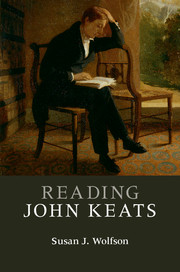
-
Susan J. Wolfson, Chapter 6 "Still Romancing: The Eve of St. Agnes; a dream-sonnet; Labelle dame" Reading John Keats, Princeton University, New Jersey, pp. 72-86
I designed this course myself and am looking forward to teaching it this semester. If you have a question or a problem in urgent need of resolution, please contact me in class or at [email protected]. (I am the manager.)
Post Your DQs and BIG WORDS BOTH on Canvas AND on this google document.
“But not to the degree to contaminate—”
“To contaminate?”—my big word left her at a loss. I explained it. “To corrupt.”
--Henry James, The Turn of the Screw (1892)
Albert Camus, "Appendix: Hope and the Absurd in the Work of Franz Kafka from The Myth of Sisyphus and Other Essays"
All recommended readings are optional. First day of class. Let's read Keat's Romantic poem "Bright Star" aloud and then discuss it to discover what kind of formal attention a close reading involves. Then let's watch Abbie Cornish, playing Fanny Brawne, deliver "Bright Star" very emotionally, Brawne's heart broken into a thousand pieces by Keats' death (he was just 25), at the end of Jane Campion's wonderful film, Bright Star (2009). If we are moved, moved perhaps even to weep, how does Cornish tap in the language and form of the poem to move us so deeply? What is Keats doing with words to leave us his poem as a resource for living?
JOHN KEATS Bright Star Soundtrack- 06--Bright Star-Abbie Cornish / "Bright Star" (2009) ending
“Bright star, would I were stedfast as thou art”
Susan Wolfson's comments, p. 140
TENTATIVE SCHEDULE (Please expect minor adjustments to be made in the schedule from time to time; all changes will be announced both in class and on the class listserv.)
YOUR FIRST ASSIGNMENT:
THE MYSTERY OF HENRI PICK - Trailer
DUE tomorrow, January 10 by 5:00 PM. Watch The Mystery of Henri Pick (dir. Rémi Bezançon, 2018). Write two Discussion Questions (50-200 words each) and three shots. Post Your DQs and THREE SHOTS on Canvas AND on this google document. Due tomorrow, Thursday, January 10 by 5:00 p.m. If you want to learn how to improve your discussion questions, I will be happy to meet with you during office hours or by appointment and show you.
January 9 General Questions for the Course: What Is Close Reading? What Is Closed Reading?
We will begin to address these questions by looking at one film and four literary works with analogues to close readers: the journalist; the cafe observer; the detective; the ghost-busting governess; the biographer; the Freudian analyst. Some of these analogues are related to forensics--evidence to establish the truth in a courtroom and reconstructing a crime scene. This legal method reading has its limits, as all analogies do (at some point, they break down). It assumes that truth is there to be found, discovered, and recovered. The truth is logical, rational, and a matter of consensus. In literature, the truth may be contradictory, impossible to ascertain, or to separate from irrational fantasies. What's in the text? What is not? These are not reducible to legal questions. Close reading is not exactly the opposite of closed reading, as we shall see.
Here is the an analogue of the journalist as close reader:
THE MYSTERY OF HENRI PICK - Trailer
January 11 Close(d) reading? The journalist (reading) as coroner; the library as tomb.
REQUIRED VIEWING:
The Mystery of Henri Pick (dir. Rémi Bezançon, 2018)
The film is in French with English subtitles. You will need to borrow a copy of the film on disc or rent it on a streaming service.

Recommended viewing:
Watch online a French TV show (in French) of the kind represented in the film. Here is an example:
Découvrez la bibliothèque idéale: L'importance de la lecture dans la compréhension Feb 9, 2018
Recommend Reading:
Richard Brautigan, The Abortion: an historical romance 1966 (1972)
David Foenkinos, The Mystery of Henri Pick (read as an ebook)
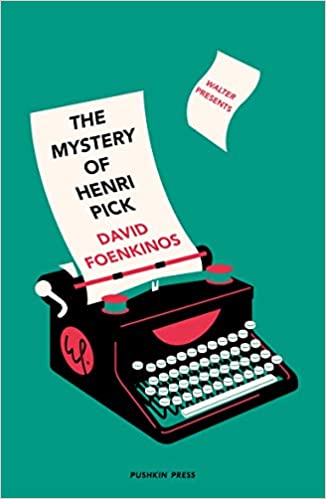

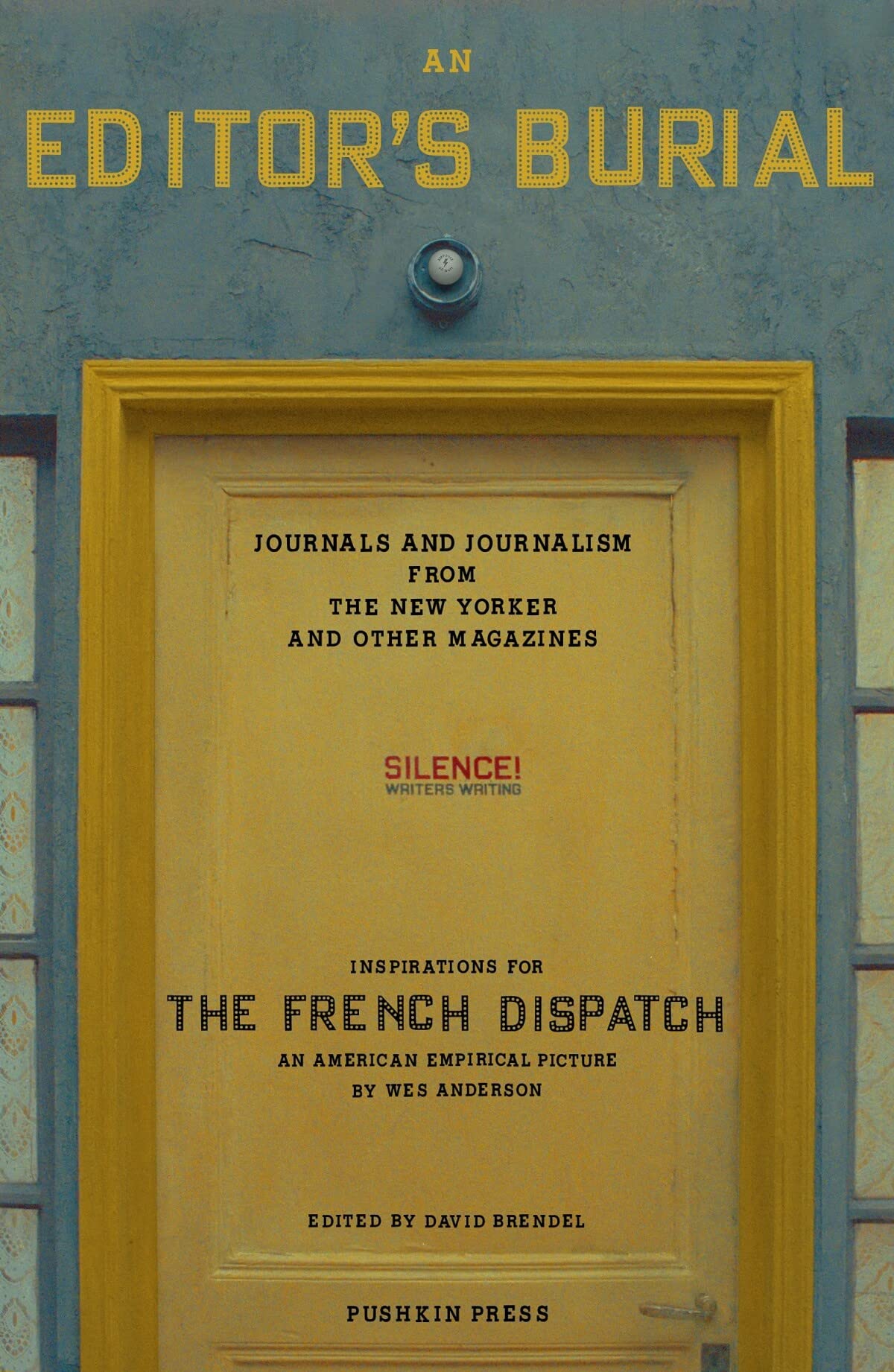
Salon des Refusés (1863)
DUE January 12 by 5:00 PM: Read the poem "Aire and Angels" by John Donne several times. Write two Discussion Questions about the way it is written in a clear yet somewhat difficult manner and Three BIG WORDS. If you want to learn how to improve your discussion questions, I will be happy to meet with you during office hours or by appointment and show you.
January 13 John Donne, “Dark texts need notes.”
REQUIRED READING: Difficult Reading, or Donne in the Dark
John Donne, "Aire and Angels"
Recommended Reading:
John Donne, "The Good Morrow"
John Donne, "Lecture Upon a Shadow"
John Donne, "A Valediction of the Book"
(See also this 1962 Harvard Crimson review of Reuben A. Brower's edited collection, In Defense of Reading. Brower developed the idea of "slow reading.")
Margaret Edson, W;t (1995) has a scene with a terminally ill English professor noting a debate about a comma in one of Donne’s "Holy Sonnets." The main character mentions the name of a former student who published an ariticle on the Holy Sonnet. Here it is:
Richard Strier, "John Donne Awry and Squint: The "Holy Sonnets," 1608-1610"
Modern Philology Vol. 86, No. 4 (May, 1989), pp. 357-384
George Steiner, "On Difficulty" The Journal of Aesthetics and Art Criticism Vol. 36, No. 3, Critical Interpretation (Spring, 1978), pp. 263-276
January 16
Holiday
To sign up to lead class, go to this google doc.
Create a google doc for your notes and share it with me by 5:00 p.m. the day before you are leading so I can add my thoughts. Make sure you give me permission to edit the document.
YOUR THIRD ASSIGNMENT, Due January 17 by 5:00 p.m.:
Here is an example of the detective as close reader:
Sherlock "A Study in Pink" / (season 1, episode 1) 2010
The Crime Scene: Five letters--spelling "Rache"--have been scratched into a wooden floor by a murder victim. "Rache" is a German word meaning "revenge." But it turned out to be the first five letters of the proper name, "Rachel," the first name of the murderer.




Write two Discussion Questions and Three BIG WORDS on Edgar Allan Poe's "The Man of the Crowd." Post Your DQs etc BOTH on Canvas AND this google document here. If you want to know how to improve your discussion questions, I will be happy to meet with you during office hours or by appointment and show you.
DUE January 17 by 5:00 PM. Due January 17 by 5:00 p.m.
January 18 Closed Reading: Observation and Classification as Method or Madness? "Es läßt sich nicht lesen." (German for "it does not let itself be read.")
REQUIRED READING:
Edgar Allan Poe, "The Man of the Crowd" in The Annotated Poe, Ed. Kevin J. Hayes (Harvard UP, 2015 )

Recommended Reading:
Poe's Source? Edward Bulwer Lytton, Eugene Aram: A Tale (1832)
Friedrich August Moritz Retzsch Faust
Retzsch’s Outlines ( 1779-1857)
ISAAC DISRAELI, "RELIGIOUS NOUVELLETTES" in CURIOSITIES OF LITERATURE
“Hortulus Animæ cum Oratiunculis Aliquibus Superadditis” of Grünninger.
https://www.eapoe.org/works/mabbott/tom2t042.htm
https://blogs.commons.georgetown.edu/citylit/files/2015/07/poe_man_of_the_crowd.pdf

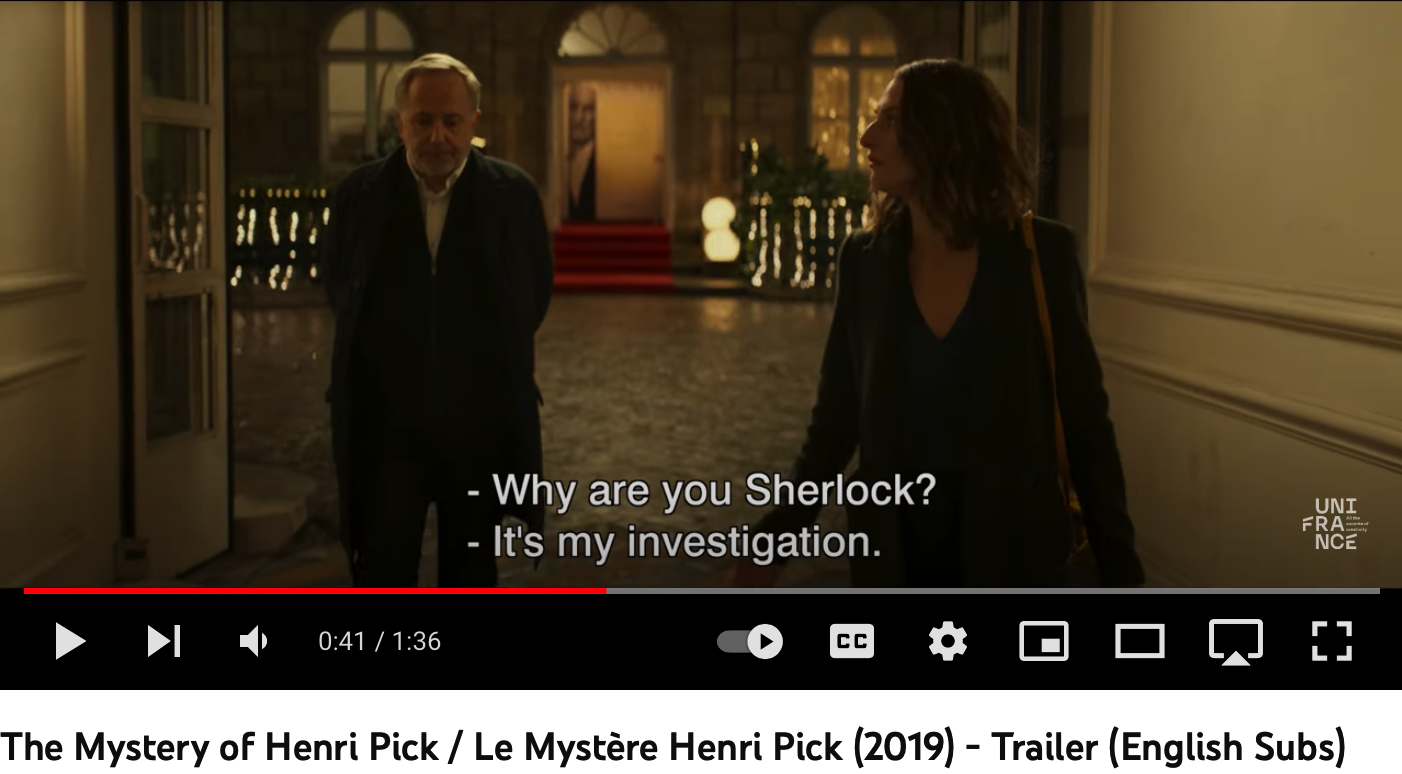
Carlo Ginzburg, “Clues: Morelli, Freud, and Sherlock Holmes,” in History Workshop, No. 9 (Spring, 1980), pp. 5-36.
Bran Nicol, "Reading and Not Reading 'The Man of the Crowd': Poe, the City, and the Gothic Text," Philological Quarterly, 91 (3) (Summer, 2012): 465-93.
Stephen Rachman, “Reading Cities: Devotional Seeing in the Nineteenth Century,” ALH 9 (Winter 1997), pp. 653- 675
Charles Dickens (source for Poe's Man of the Crowd), "The Streets—Morning, The Streets—Night, Shops and their Tenants, Meditations in Monmouth-Street, and Gin-Shops," in Sketches from Boz
Sketches by Boz "The Drunkard's Death"YOUR FOURTH ASSIGNMENT, Due January 19 by 5:00 p.m.
Read Edgar Allan Poe's "The Purloined Letter." Write two Discussion Questions and Three BIG WORDS. Post Your DQs etc. BOTH on Canvas AND this google document here.
Due Thursday, January 19 by 5:00 p.m.
I will no longer post due dates for Discussion Questions (DQs) and BIG WORDS. The work is due every Sunday and Tuesday by 5:00 p.m. unless otherwise noted.
January 20 The Eve of St. Agnes (we'll read Keats' poem on it later this semester)
The detective as close reader; hiding in plain sight; the frame as narrative device; is the reader outside the frame?
REQUIRED READING:
Edgar Allan Poe, "The Purloined Letter" in The Annotated Poe, Ed. Kevin J. Hayes (Harvard UP, 2015)

Recommended Readings:
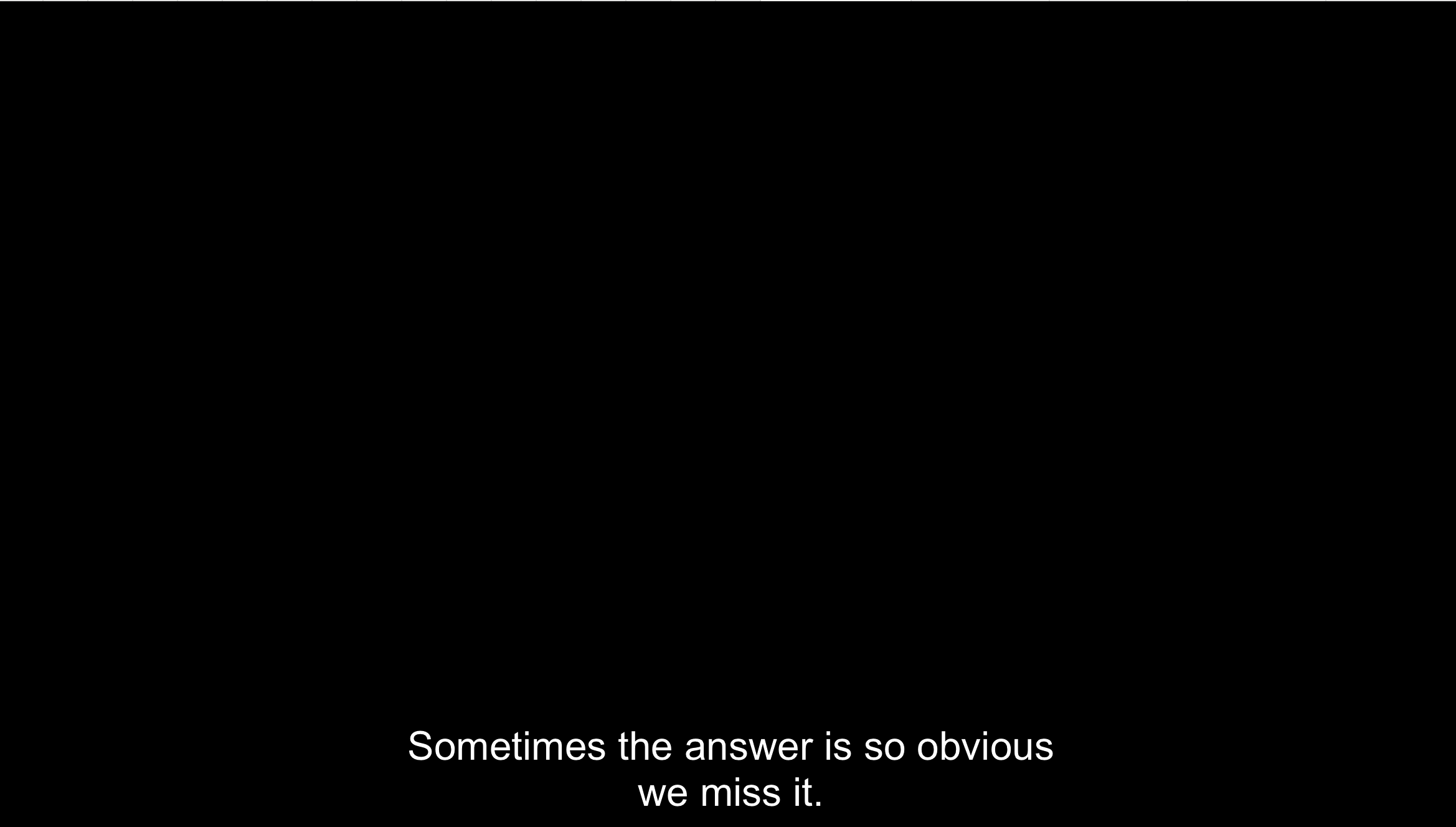
The Mystery of Henri Pick

--Edgar Poe, "The Murders of the Rue Morgue"
The fate of reading and other essays by Hartman, Geoffrey H
Timestamp 1:23:02 The Mystery of Henri Pick (dir. Rémi Bezançon, 2018)
D.A. Greetham, "Textual Forensics"; Sir Arthur Conan Doyle, "A Case of Identity" (1899) and "The Adventure of the Cardboard Box" (1893); Sigmund Freud, "The Moses of Michelangelo" (1914) Standard Edition, 13: 209-238. Digital "Exploded Manuscript" of Freud's essay."How DNA Changed the World of Forensics" NY Times, May 18, 2014
Walter Benjamin on Poe and Charles Baudelaire in "On Some Motifs in Baudelaire" and translating "À une passante" (pp. 223-24) and "Le Créspucle du soir"( pp. 324-27; p. 349n17)
Geoffrey H. Hartman, "Literature High and Low: The Case of the Mystery Story," The Fate of Reading and other Essays (1975), pp. 203-22
Experience: Description, Image, Memory
How Electricity Transformed Paris and Its Artists, from Manet to Degas
Joseph G. Kronick, "Edgar Allan Poe: The Error of Reading and the Reading of Error,"
"This change of weather had an odd effect upon the crowd, the whole of which was
at once put into new commotion, and overshadowed by a world of umbrellas."

Foreign Correspondent (dir. Alfred Hitchcock, 1940)
I will no longer post due dates for Discussion Questions (DQs) and BIG WORDS. They are due every Sunday and Tuesday by 5:00 p.m. unless otherwise noted.
January 23 The Governess as Close Reader (her story is being read aloud by a narrator to some friends) How Can You Tell What is True? Confessing and Narrating; two narrators; the story within a story.
REQUIRED READING:
Henry James, The Turn of the Screw, Prologue and Chapters 1-VII (including chapter VII)
I recommend all of the editions below. Any one of them will do, though Peter G. Beidler's edition is the only edition to include both the Collier Weekly magazine version and the revised version in James' New York edition. Beidler is also the only editor to explore James' revisions exhaustively and make a persuasive case in his introduction and at greater length in his book The Collier's Weekly Version of The Turn of the Screw that they are significant. He is the best closer reader.
Henry James, The Turn of the Screw: A Case Study in Contemporary Criticism (Bedford/St. Martin's) Peter G. Beidler (Ed.)
Henry James, The Turn of the Screw and Other Ghost Stories (Penguin) Philip Horne (Ed.)
Henry James, The Turn of the Screw and Other Stories (Oxford World's Classics) T. J. Lustig (Ed.)
Henry James, The Turn of the Screw (Norton Critical Editions) Jonathan Warren (Ed.)




Recommended Reading:
To see what’s really going on, it helps to get close. NY Times series
"The 'frame' shows us through its incompleteness that there is no easy recourse to the author, whether implied or real, just as for the governess herself there is to be no recourse to the master, her employer."
--William R. Goetz, "The 'Frame' of The Turn of the Screw: Framing the Reader," Studies in Short Fiction 18.1 (1981): 71-7; 73.
January 25
REQUIRED READING: How do you know when to stop (re)reading? Do you have to stop reading to keep your sanity? (Neil Herz, The End of the Line) The Truth on Trial: Narrative Framing (1)
Henry James, The Turn of the Screw, Chapter VIII-XIV (including Chapter XIV)
Recommended Reading:
The Publication History of James' Story (quoted from wikisource):
"The Turn of the Screw" in Collier's Weekly (January 27–April 16, 1898)
January 27
DISCUSSION
FIRST PAPER DUE Saturday, January 28, by 11:59 p.m. Email all papers for the course to me at [email protected].You may write on any one of the assigned texts we have discussed except for The Turn of the Screw. 500-700 words.
John Donne, "Aire and Angels," Ed. Theodore Redpath for notes and APPENDIX V
January 30 James as his own closer reader (and editor) Write one DQ on each reading.
REQUIRED READING:
1. Henry James, The Turn of the Screw, Chapter XV to the end of the story
2. The Preface to Vol. 12 of the New York Edition (1908)
February 1 Ghost writing? "The story will tell." The Freudian reader as ghostbuster; the Freudian Reader as Close Reader? How close should you read? Can you read too closely?
REQUIRED READING: Write one DQ on each reading.
1. Edmund Wilson, "The Ambiguity of Henry James," (just read pages 89 through 95) first published in The Triple Thinkers (1948); revised version of a longer article originally published in Hound and Horn, VII, 385-406 (April-June, I933-34), 385-406.
2. Robert B. Heilman, "The Freudian Reading of The Turn of the Screw," Modern Language Notes Vol. 62 November, 1947, pp. 433-445.
Recommended:
Robert B. Heilman, "The Turn of the Screw as Poem," University of Kansas City Review 14 (1948): 277–89.
Harold C. Goddard, "A Pre-Freudian Reading of The Turn of the Screw," Nineteenth-Century Fiction 12 (1957): 1–36.
February 3
DISCUSSION (no required reading)
John Donne, "Aire and Angels" commentary and APPENDIX V, Ed. T Redpath
The literary page layout--Stéphane Mallarmé, "Un coup de Des jamais n'abolira le hasard"--white background becomes noticed as space, metaphorically becomes blank space.
Comparative (non)Reading (You may of course ignore the French original and read the English translation.)
Stéphane Mallarmé, "Un Coup de Des n'abolira le hasard" / "A Throw of the Dice Will Never Abolish Chance," ed. and trans. A. M. Blackmore, Elizabeth McCombie, in French and English. 1897 and 1914 versions here--"a swift reading."
See Also / Further Reading
The Manuscript of Mallarmé's poem.
Caroline Bergvall & Nick Thurston, The Die Is Cast (2009). Only the last word of the translated title of the poem appears on the front cover, and the book is bound with one staple, just to the left of "CAST." Unfortunately, you can't see the staple in the digitzed image below.
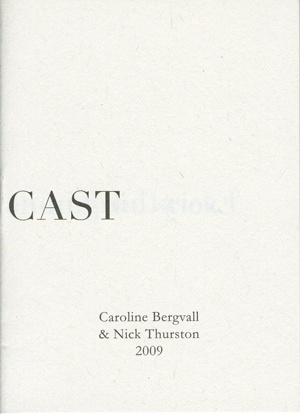
Robert Walser, Microscripts

February 6 Is there a way out of reading? Is reading always open? Is is there always another way you have to turn the screw? Is the close reader sane or insane? Is the close reader a misreader? How would you know?
REQUIRED READINGS Write on DQ on each set of readings:
Shoshana Felman, "Turning the Screw of Interpretation," Yale French Studies No. 55 / 56, Literature and Psychoanalysis. The Question of Reading: Otherwise (1977), pp. 94-207.
1. Write your first DQ on these sections of Shoshana Felman's "Turning the Screw of Interpretation,":
I. An Uncanny Reading Effect," "II. What is a Freudian Reading?," and "IV. The Turns of the Story's Frame: A Theory of Narrative" pp. 94-102; 102-113; and 119-38.
2. Write your second DQ on these sections of Shoshana Felman's "Turning the Screw of Interpretation":
III.The Conflict of Interpretations: The Turns of the Debate, and X. A Ghost of a Master pp. 113-19 and pp. 203-07
NOTE: Felman's justly celebrated essay was retitled and republished as "Henry James: Madness and the Risk of Practice [Turning the Screw of Interpretation]," 141-250 in Writing and Madness (literature/philosophy/psychoanalysis) (1985); then republished with an "updated" new preface in 2003 after first appearing in the same book translated in French as La Folie et la chose littéraire (1978) but retitled as "Henry James: Folie et Interpretation," 237-346; then revised and republished again in a shorter version in a book edited by Felman, Literature and Psychoanalysis: The Question of Reading: Otherwise (1985), 94-207; and then abridged in excerpts and republished as "Turning the Screw of Interpretation," in Henry James, The Turn of the Screw Jonathan Warren, Ed. (Norton Critical Editions, 2021), pp. 215-30.
February 8
REQUIRED READING:
Write on DQ on each set of readings:
1. Write your first DQ on this section of Shoshana Felman's "Turning the Screw of Interpretation":
"V. The Scene of Writing: Purloined Letters" in Shoshana Felman's "Turning the Screw of Interpretation," pp. 138-48
2. Write your second DQ on this section of Shoshana Felman's "Turning the Screw of Interpretation":
VI. The Scene of Reading: The Surrender of the Name," in Shoshana Felman's "Turning the Screw of Interpretation," pp. 149-69
February 10
DISCUSSION
Recommended Readings:
Not saving or damning Felman's text:
Freud, The Interpretation of Dreams, Felman
Felman Freud, "The 'Uncanny'".pdf
Freud, S. (1910) 'Wild' Psycho-Analysis. The Standard Edition of the Complete Psychological Works of Sigmund Freud 11:219-228.
Sigmund Freud, The Interpretation of Dreams 3rd edition
A Casebook on Henry James's "The Turn of the Screw," ed. Gerald Willen, New York: Thomas Y. Crowell Company, 1969, 2nd edition
Sigmund Freud, Delusion and Dream An Interpretation in the Light of Psychoanalysis of Gradiva, Part I
"Let us pause for a moment at this journey, planned for such remarkably uncogent reasons, and take a closer look at our hero's personality and behaviour."
Carlo Ginzburg, “Clues: Morelli, Freud, and Sherlock Holmes,” in History Workshop, No. 9 (Spring, 1980), pp. 5-36.
Sigmund Freud (1901) A. A. Brill translation Psychopathology of Everyday Life (1914)
REQUIRED READINGS:
VII. A Child is Killed in Shoshana Felman's "Turning the Screw of Interpretation," pp. 161-77
VIII. Meaning and Madness: the Turn of the Screw, in Shoshana Felman's "Turning the Screw of Interpretation," pp. 177-84
IX. The Madness of Interpretation: Literature and Psychoanalysis in Shoshana Felman's "Turning the Screw of Interpretation," p.185-204
February 15
REQUIRED VIEWING: The Fate of Reading
Things to Come (L'Avenir) dir. Mia Hansen-Løv, 2016
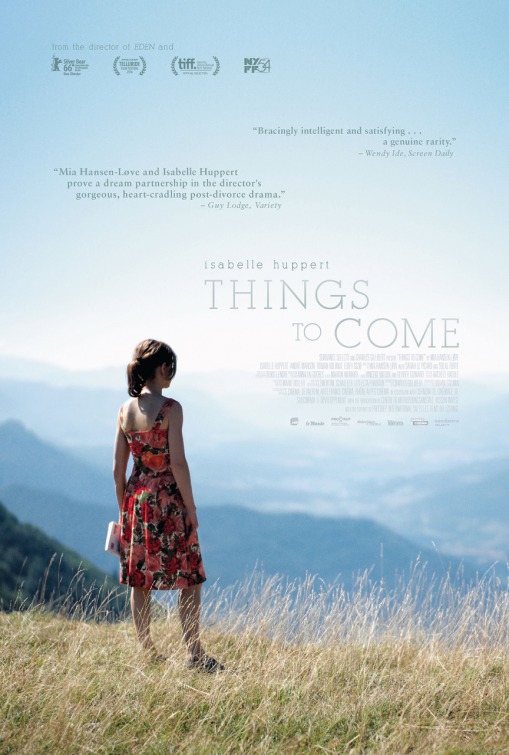
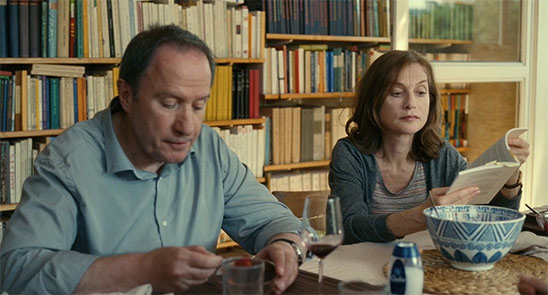
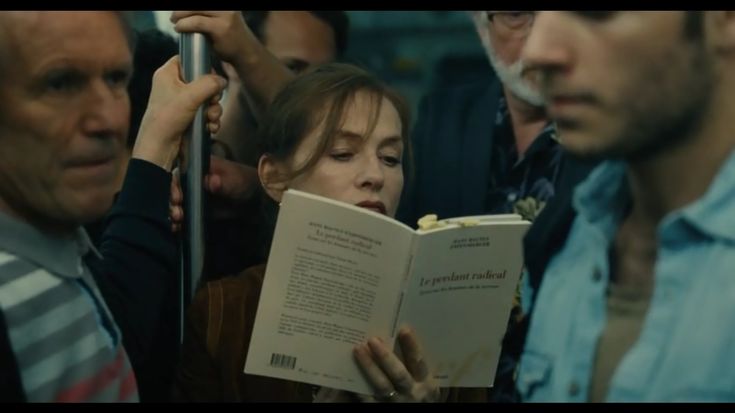

February 17
DISCUSSION
I. A. (Ivor Armstrong), Richards; Reuben Arthur Brower; Helen Hennessy Vendler, ed. I. A. Richards; Essays in his Honor (1973)
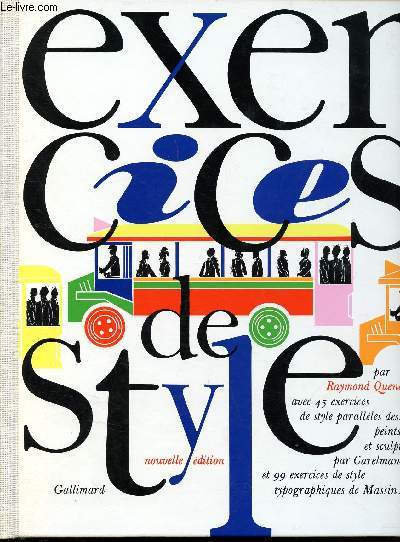
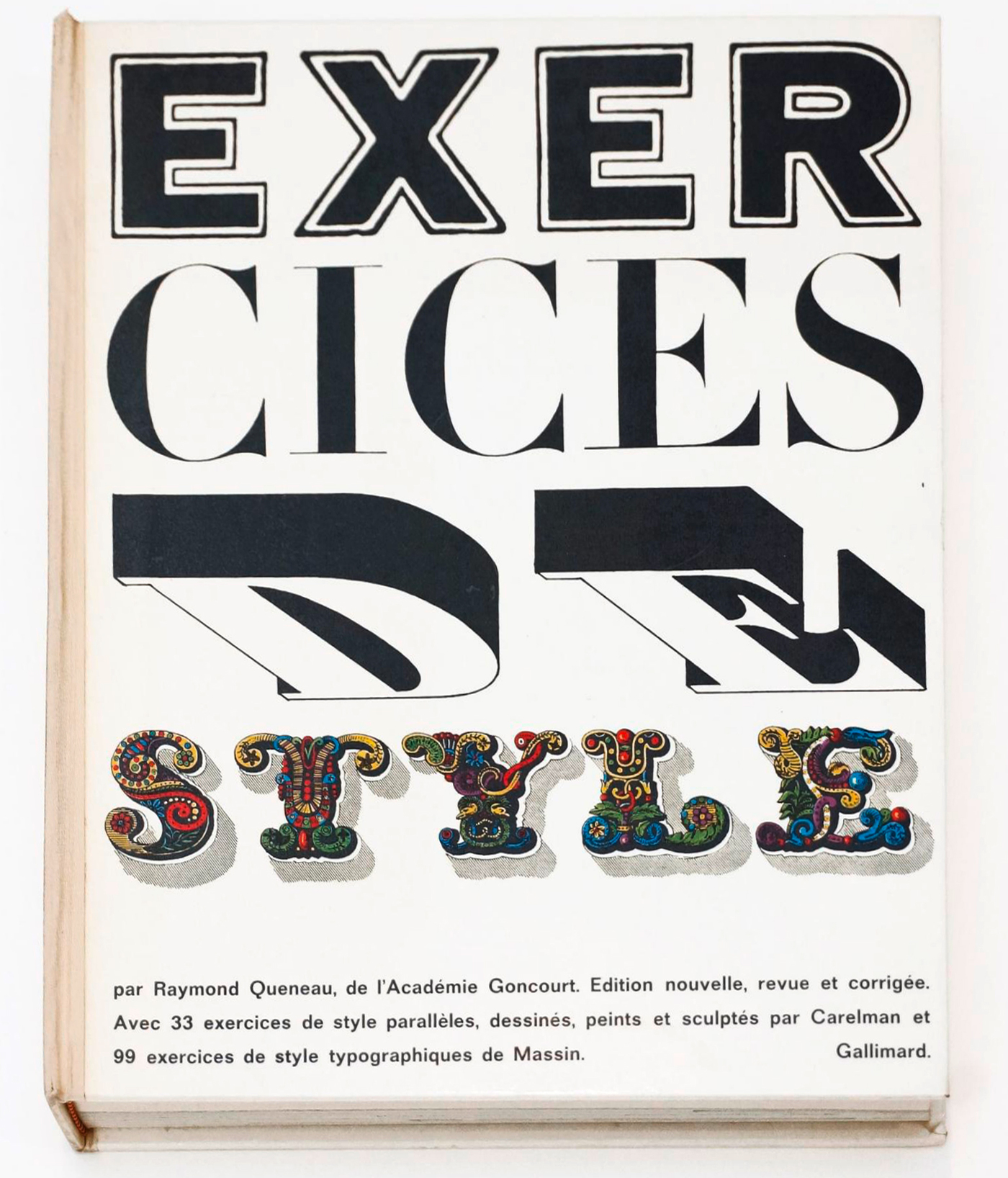
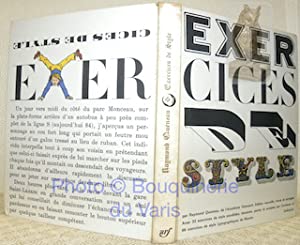
Raymond Queneau, Exercice de Style 1947 1963
February 20
REQUIRED READINGS:
1. William Shakespeare, "Sonnet 93" and "Sonnet 94" with commentary on "Sonnet 93" and "Sonnet 94"
in Stephen Booth, Ed. Shakespeares Sonnets (Yale UP, 1977)
Recommended Reading:
Susan J. Wolfson, "Reading Intensity: Sonnet 12"
Helen Vendler, ed. The Art of Shakespeare's Sonnets (Harvard UP, 1997)
John Crowe Ransom," Shakespeare at Sonnets," The Southern Review (Winter 1938), pp. 531-96.
Stephen Booth, Essay on Shakespeare's Sonnets (Harvard UP), pp. 26–8.
February 22 The Critic as Close Reader
2. William Empson, "They That Have Power," in Some Versions of Pastoral, pp. 75-96

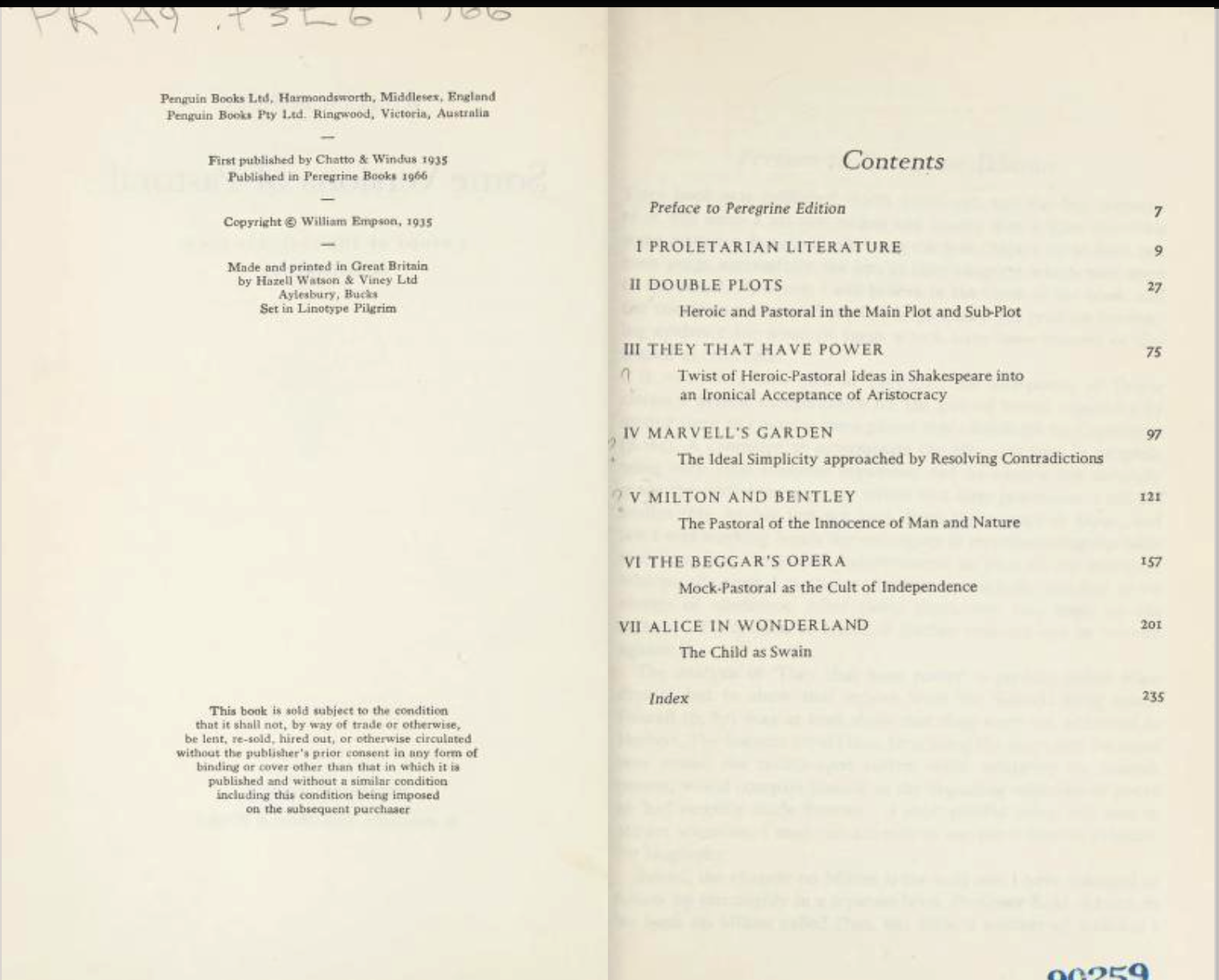
February 24
DISCUSSION
February 27
REQUIRED READING:
1. Sonnet 75 (“So are you to my thoughts as food to life”)
2. Jen Bervin, Nets
http://www.webdelsol.com/Double_Room/issue_five/Jen_Bervin.html
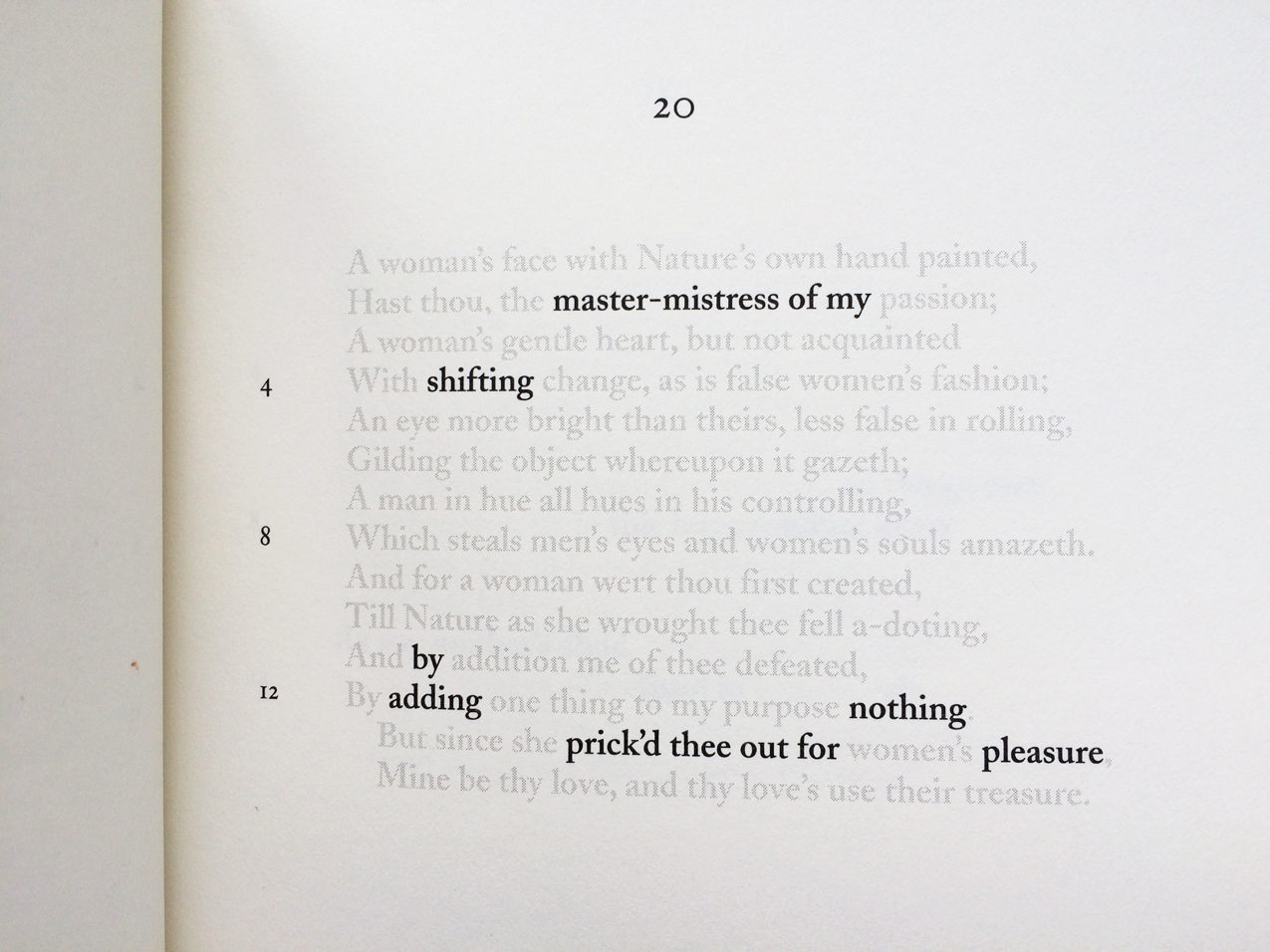
Recommended Reading:
March 1
REQUIRED READINGS (Write two DQs):
1. Willian Empson, 7 Types of Ambiguity (1947), second edition, pp. 2-3; 226-233. There are two digital facsimiles on archive.org: first and second. Readers left their marks in the sourced printed copies. There is also a diplomatic transcription here. You can cut and paste from it.
2a. Willism Shakespeare, "Sonnet 73" in Stephen Booth, Ed. Shakespeares Sonnets, preface, facing page facsimiles and modernized sonnets, and commentary (Yale UP, 1977). (Just read the poem. You don't need to read the commentary.)
2b. George Herbert's "The Sacrifice" (1633; reprinted 1876), pp. 19-26. (Here is a later edition with footnotes--[1899].)
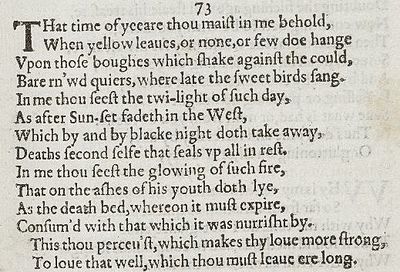
"Was ever grief, &."
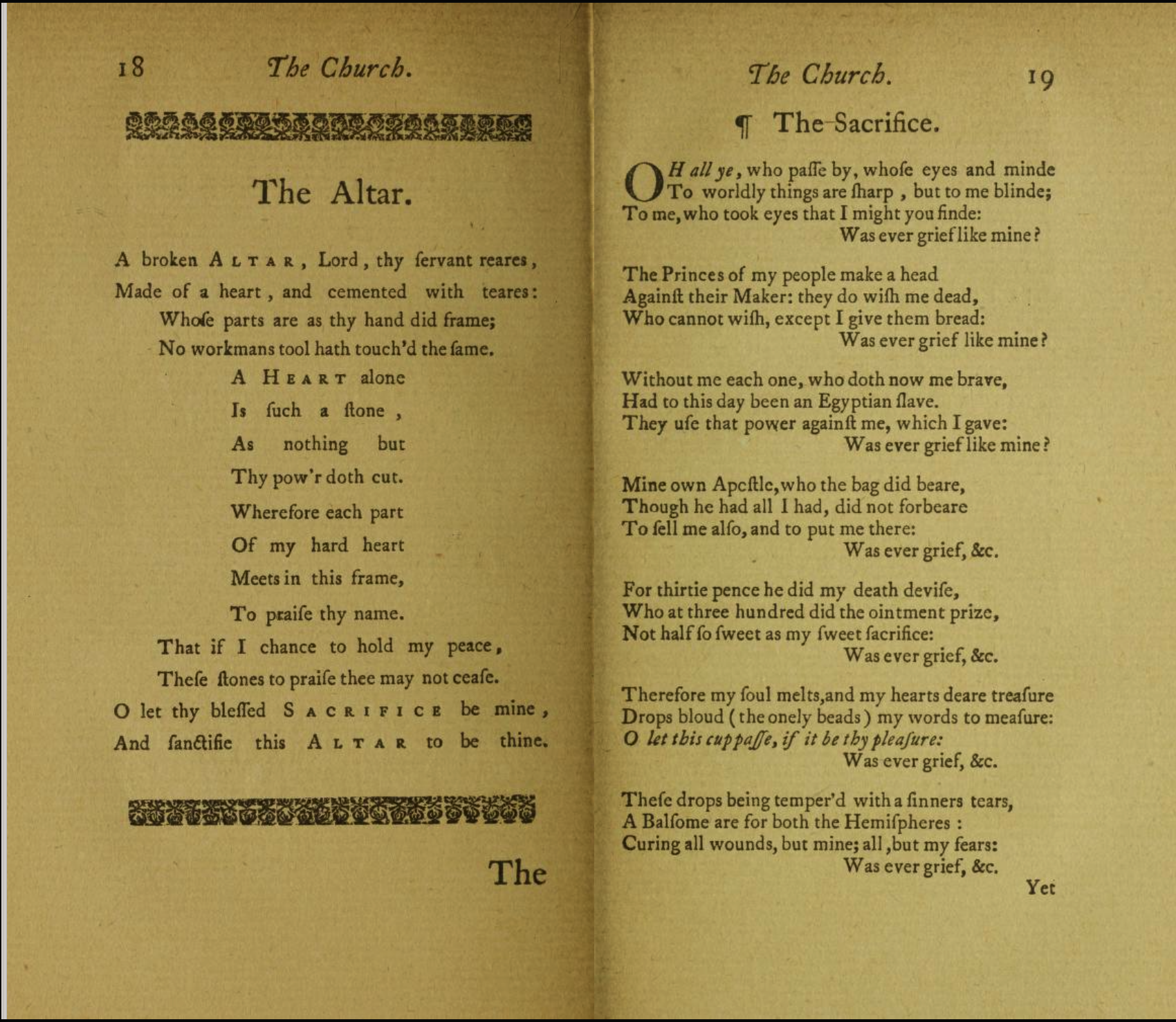
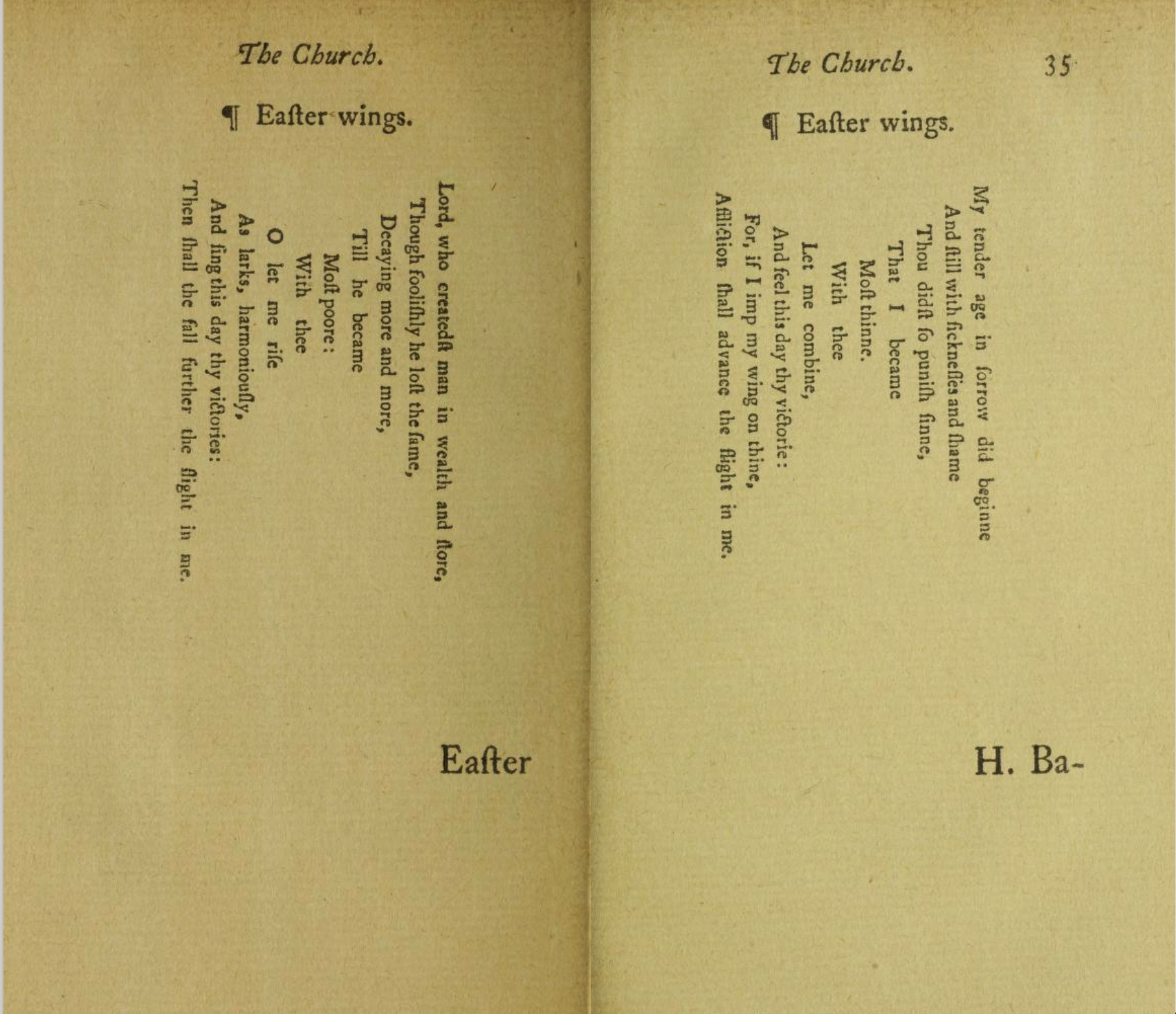
RECOMMENDED READING:
Ran- dom Cloud, "FIAT fLUX," in Crisis in Editing : Texts of the English Renaissance
"warning" "The first and only previous edition of this book was pub-
lished sixteen years ago. Till it went out of print, at about
the beginning of the war, it had a steady sale though a small
one; and in preparing a second edition the wishes of the buyers
ought to be considered. Many of them will be ordering a
group of books on this kind of topic, for a library, compiled
from bibliographies; some of them maybe only put the book
on their list as an awful warning against taking verbal analysis
too far.
because they have to be borne in mind in any case.)
--William Empson, Seven Types of Ambiguityp. 241
The Temple Sacred Poems and Private Ejaculations. By Mr. George Herbert.
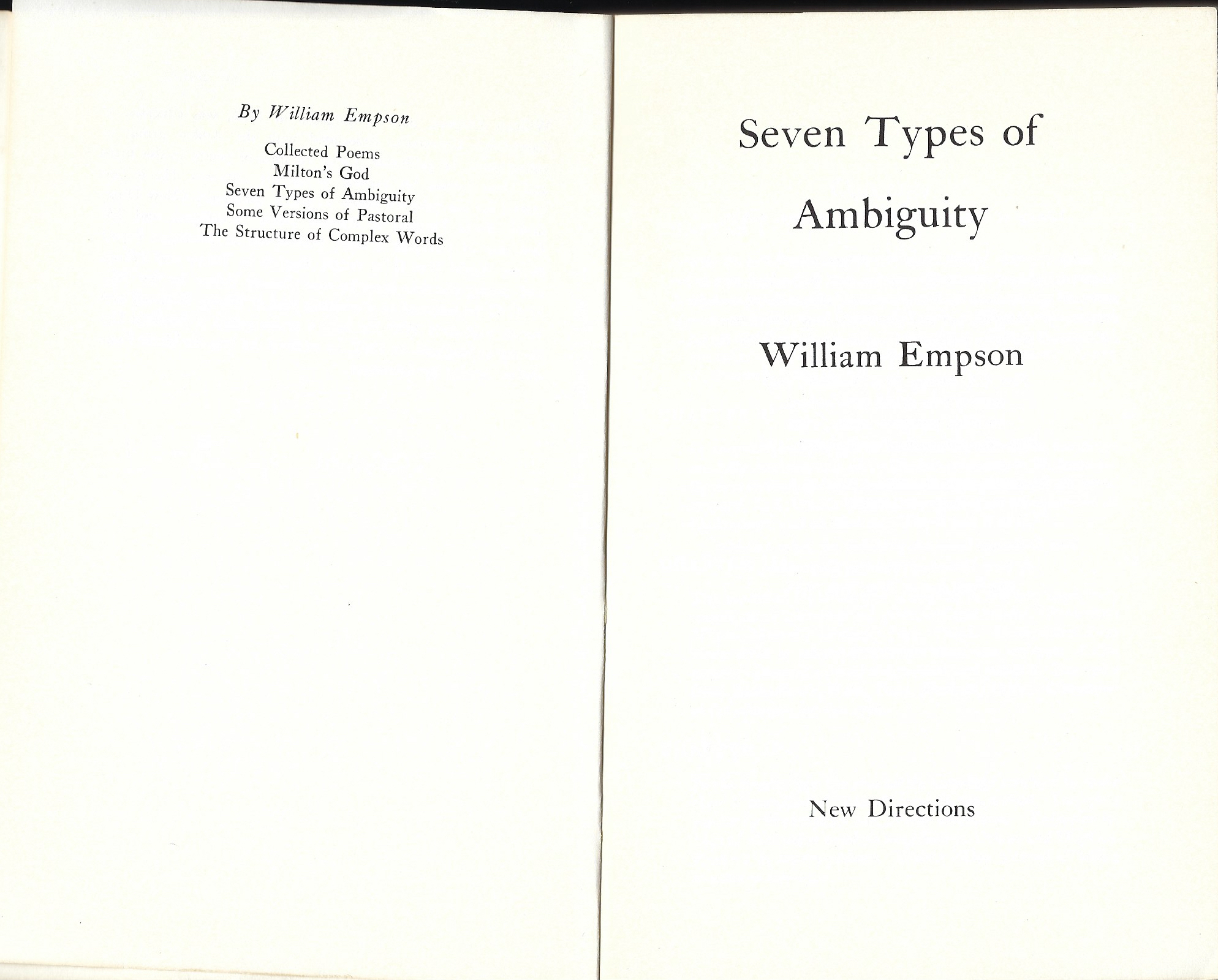
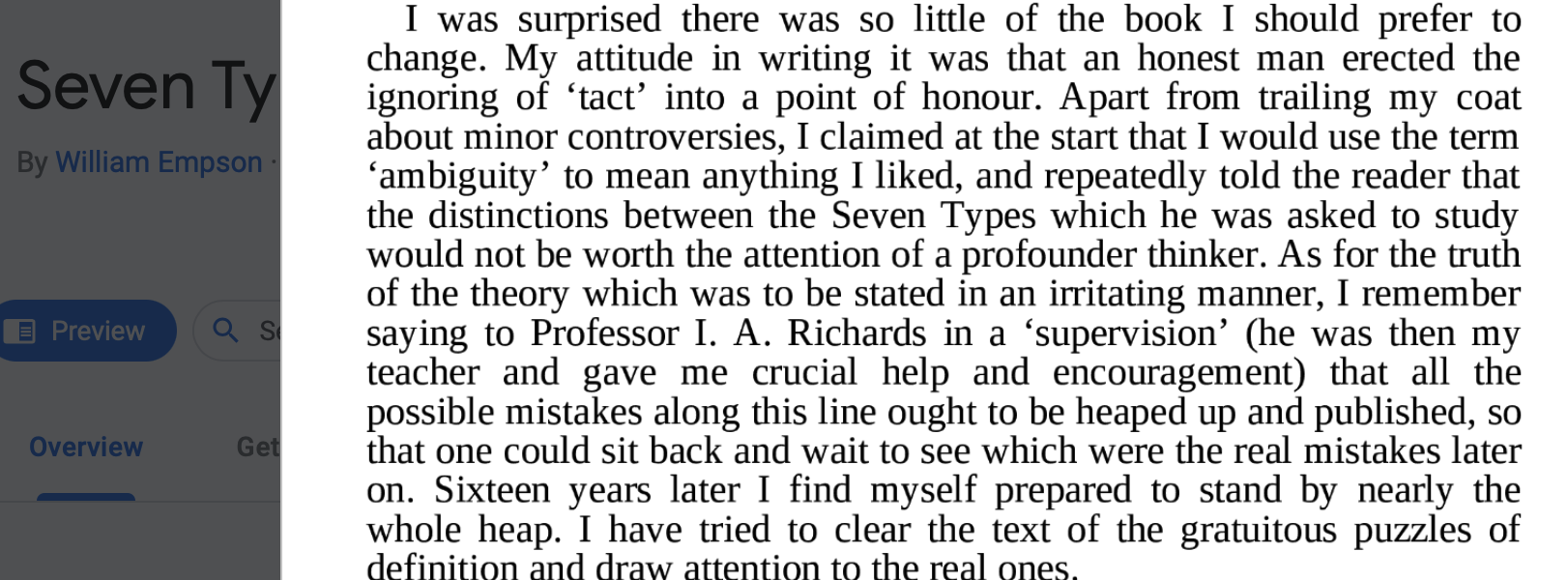


At the end . . . (I'll translate it in class.)
fourchue--forked
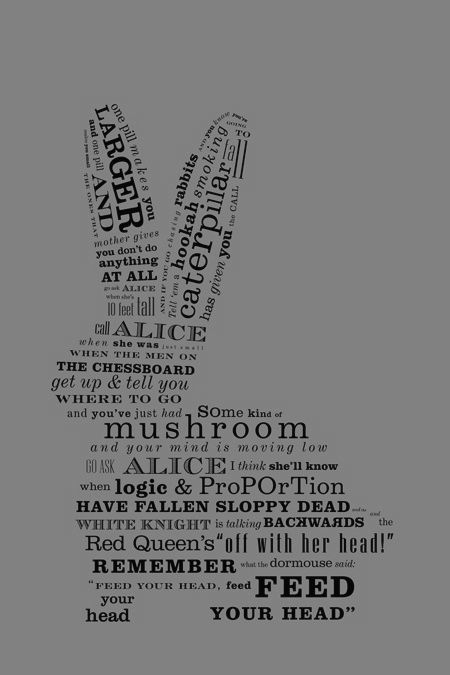
Frank Kermode, "Disgusting" Vol. 28 No. 22 · 16 November 2006
SECOND PAPER DUE March 4 by 11:59 p.m. READ THROUGH THIS WEBPAGE. READ ALL OF IT. CLOSELY. VERY CLOSELY. PLEASE NOTE: Now that you have learned from your mistakes in our discussion of your first paper, and now that you have practiced writing twice a week through your DQs, I fully expect you to be able to make an argument in your essay, write grammatical sentences, use words properly, and punctuate properly. Papers that have ungrammatical sentences, mispunctuate, or misuse words will get "D" grades. Be sure to give yourself time to revise and to proofread your paper carefully before you send it to me at [email protected]. I recommend reading your work aloud. It's a good way to see what you need to revise. You can also get help at the Writing Program. See also the Plain Style: A Guide to Written English. READ THROUGH THIS WEBPAGE. READ ALL OF IT. CLOSELY. VERY CLOSELY.
Email your second paper to me at [email protected]
March 3
DISCUSSION
Recommended: P. D. Eastman, Go, Dog. Go! (1961)
Stephen Booth, “Go, dog. Go! A Map of the Beautiful,” in Reading What's There Essays on Shakespeare in Honor of Stephen Booth Ed. MICHAEL J. COLLINS (University of Delaware Press, 2014)
REQUIRED READING: (Write one DQ on each reading.)
1. William Wordsworth, "The Lucy Poems" (1798-1801)
2. J. Hillis Miller versus Meyer Abrams on Wordsworth's "A Slumber Did My Spirit Seal"
Recommended Reading:
Adam Kirsch, "Strange Fits of Passion Wordsworth’s Revolution," in The New Yorker, November 27, 2005.
REQUIRED READING
I. A. Richards, Practical Criticism (1929) "Preface; Intoduction; Part Two: Documentation, pp. vii-29; Appendix B, C, and D, pp. 347-57.
March 10
DISCUSSION
See Also / Further Reading:

Sharmila Cohen and Paul Legault, Ed. The Sonnets: Translating and Rewriting ShakespeareI. A. Richards, Mencius on the Mind: Experiments in Multiple Definition (1964)


In Brief Gatherings By Gill Partington May 10, 2019 IN THIS REVIEW CATCH-WORDS 148pp. Information as Material. Paperback, £14. Nicholas D. Nace
March 13 SPRING BREAK
March 15 SPRING BREAK
March 17 SPRING BREAK
March 20: Reading as an Academic: Your Cross-Reference to bear; Commentary as encryption / decryption.
Focus your DQs on the way Nabokov creates a fictional critical edition of a fictional manuscripts the edito will not publish; with a made up line-by-line critical commentary as well as an index by a fictional academic editor.
Required Reading:
Vladimir Nabokov, Pale Fire, pp. 11-190; ends with "and while pacing about and pondering his" (p. 80 on Gutenberg). You can read the novel online here. Or you can read a pdf of the paperback here.


Recommended Reading for Ryhming Couplets:
Alexander Pope, An Essay on Man: Epistle I

Recommended Readings:
"This new scholarship may not only have filled in the mystery of the book’s first owner and annotator; it may also show the full degree to which Milton engaged with Shakespeare, and give Milton scholars 'a new and significant field of reference' for reading his work."
Claire M.L. Bourne, "Vide Supplementum: Early Modern Collation as Play-Reading in the First Folio"
Brian_Boyd, "Index" in_Nabokov' s Pale Fire 1999
Pale Fire: A Poem in Four Cantos by John Shade 2011
Dmitri Nabokov, The Original of Laura
Yuri Leving, ed. Shades of Laura: Vladimir Nabokov's Last Novel, The Original of Laura Oct 28, 2013
March 22
REQUIRED READING
Required Reading:
Vladimir Nabokov, Pale Fire, pages 110-210, ends with "He knew she had just come across a telltale object--a" (page 150 in the Gutenberg edition.)
Recommended Reading:
Nabokov’s Copy of Eugene Onegin
Vladimir Nabokov, "Problems in Translation: "Onegin" in English," Partisan Review Vol. 22, no. 4 (1955), pp. 496-412
Edmund Wilson, "The Strange Case of Pushkin and Nabokov," The New York Review of Books

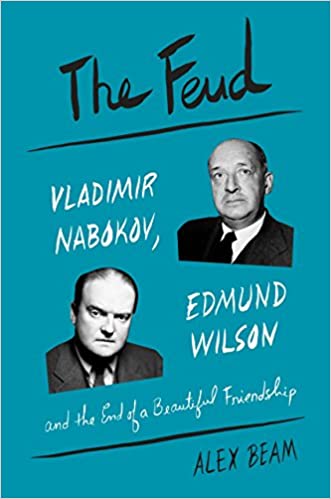
READING WITH THE INDEX
Nabokov's translation and preface (4 Volumes)
March 24 The Idea of an Ideal Text (Is there a material "text?" or even a "book?" or "page"?)
DISCUSSION
Recommended Reading:
DENNIS DUNCAN, "Indexing Fictions" in Index, A History of: A Bookish Adventure from Medieval Manuscripts to the Digital Age (2022), pp. 171-202.
See also Introduction. 1-18
Point of order 19-48

Dennis Duncan (Editor), Adam Smyth (Editor) Book Parts (2019)
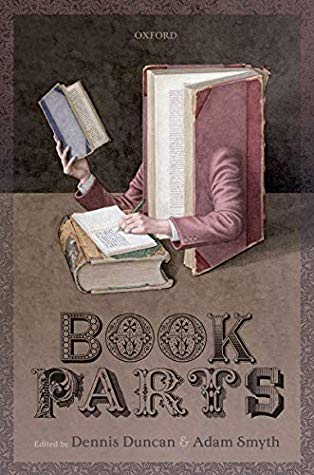
J.G. Ballard, "The Index," The Paris Review, vol 118, (Northern) Spring, 1991. It is copyright © the Estate of the Late J.G. Ballard, 1977, 1991.
Jane Austen, Emma, An Annotated Edition. Ed. Bharat Tandon (Belknap Press, 2012).
Which books does Emma read? See p. 58n.13.
Reading made easy: Leah Price, The Anthology and Rise of the Novel quotable sound bites.
March 27 Why does Gérard Genette hate Pale Fire so much? The reader as literary theorist.
Required Reading:
Genette's discussion of Pale Fire in Paratexts (p. 10; p. 84; p. 289; p. 289n.49 is on Lolita; 323; 341-43) and the conclusion.

Gérard Genette, Paratexts: Thresholds of Interpretation, pp. TBA
Table of Contents pdf of Introduction Here.

March 29:
REQUIRED READING:
Vladimir Nabokov, Pale Fire, pp. 211-315

March 31 The Reader as Devotional Poet: "See Also" as a dazzling metaphor for discontinuous reading
DISCUSSION
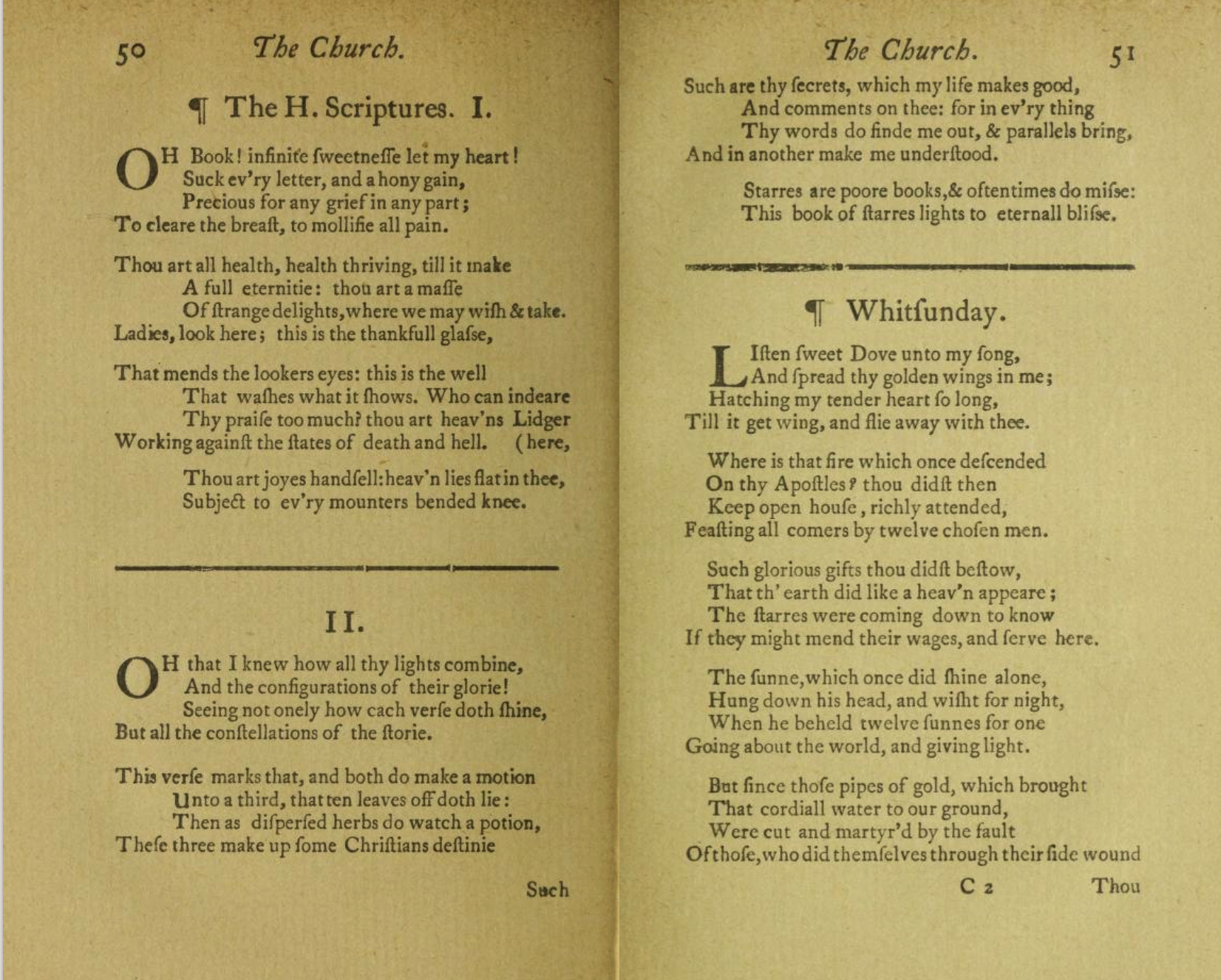
(Holy Scriptures) I I.
OH that I knew how all thy lights combine,
And the configurations of their glorie!
Seeing not onely how each verse doth shine,
But all the constellations of the storie.
This verse marks that, and both do make a motion
Unto a third, that ten leaves off doth lie:
Then as dispersed herbs do watch a potion,
These three make up some Christians destinie:
Such are thy secrets, which my life makes good,
And comments on thee: for in ev’ry thing
Thy words do finde me out, & parallels bring,
And in another make me understood.
Starres are poore books, & oftentimes do misse:
This book of starres lights to eternall blisse.
APRIL 3: Reading as Not Reading
REQUIRED READING:
John Keats, "Ode to a Nightingale"; "Ode on Melancholy"; "Ode to Psyche; and "Ode on a Grecian Urn" (in manuscript)
Cleanth Brooks, "The Heresy of Paraphrase," in The Well-Wrought Urn.
William Empson, "Thy Darling in an Urn" The Sewanee Review Vol. 55, No. 4 (Oct. - Dec., 1947), pp. 691-697 (7 pages)
Cleanth Brooks, Postscript (pp. 697-699)
RECOMMENDED READING:
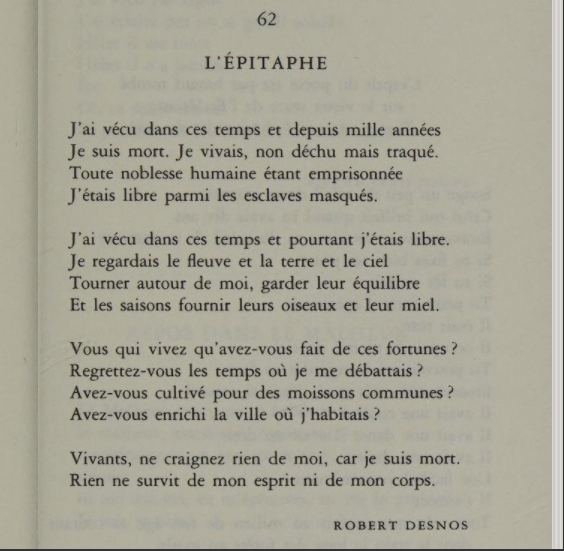
"déchu"--fallen; "traqué"--hunted; tracked down; "débattais"--struggled; "moissons"--harvest; crops
April 5 The Reader as Editor and Annotator
REQUIRED READING (one DQ on each poem):
John Keats, "The Eve of Saint Agnes" and "La Belle Dame Sans Merci" (also "Mercy" in a second version) read by Ben Whishaw
Recommended Reading:
The rough first draft of The Eve of St. Agnes (Harvard has published digitized facimiles of a huge number of Keats' manuscripts.)
A pdf of Leigh Hunt's preface and commentary on some of Keats' poems in The Indicator (1822)
On google books:
Leigh Hunt · The Indicator August 8, 1822
For "Old Romance," see
The Red Crosse Knight's dream of Una in Book I of Edmund Spenser's The Faerie Queene

DISCUSSION and Required Reading:
Susan Wolfson, A Greeting of the Spirit: Selected Poetry of John Keats with Commentaries, pp. 248-68.

REQUIRED READING:
1. William Wordsworth, Essays Upon Epitaphs (1810), pp. 642 and ff.
2. Paul De Man, "Autobiography as Defacement" MLN, Vol. 94, No. 5, Comparative Literature. (Dec., 1979), pp. 919-930
April 12 The Critic as Smartie or Dummy / On Incomprehensibility
REQUIRED READING:
Paul De Man, "The Concept of Irony"
April 14
Discussion
THIRD PAPER DUE April 16 by 11:59 p.m. [email protected]
Required Reading:
Stephen Booth, Ed. Shakespeares Sonnets, preface, facing page facsimiles and modernized sonnets, and commentary. (Yale UP, 1977)

April 19
Required Reading:
“I should now get back to the value of unmade puns.” p. 195
Stephen Booth, Shakespeare Sonnets (Yale UP, 1977)

See also, p. 537
For other related ideas p. 537
However, see the p. 536
Note that sonnets 153 and 154 are in a poetic tradition . . . [see 45 and notes, and compare such exercises tin oxymorons to Drayton, "When I first ended, then I first began” and “Those teares, which quench my hope” [No bibliographical data given for the sources of these lines] and sonnet 30 of Spenser’s Amoretti].
Note also, p. 536
14. Vade. So Q. Dowden, adopting this form, refers to Passionate
Pilgrim, x. i, "Sweet rose, fair flower, untimely pluck'd, soon
vaded."
http://www.shakespeare-online.com/sonnets/54.html
April 24
Required Reading:
Stephen Booth, Ed. Shakespeares Sonnets, preface, facing page facsimiles of the quarto sonnets and Booth's transcription modernized , and commentary. (Yale UP, 1977)
versus Helen Vendler, ed. The Art of Shakespeare's Sonnets (Harvard UP, 1997)

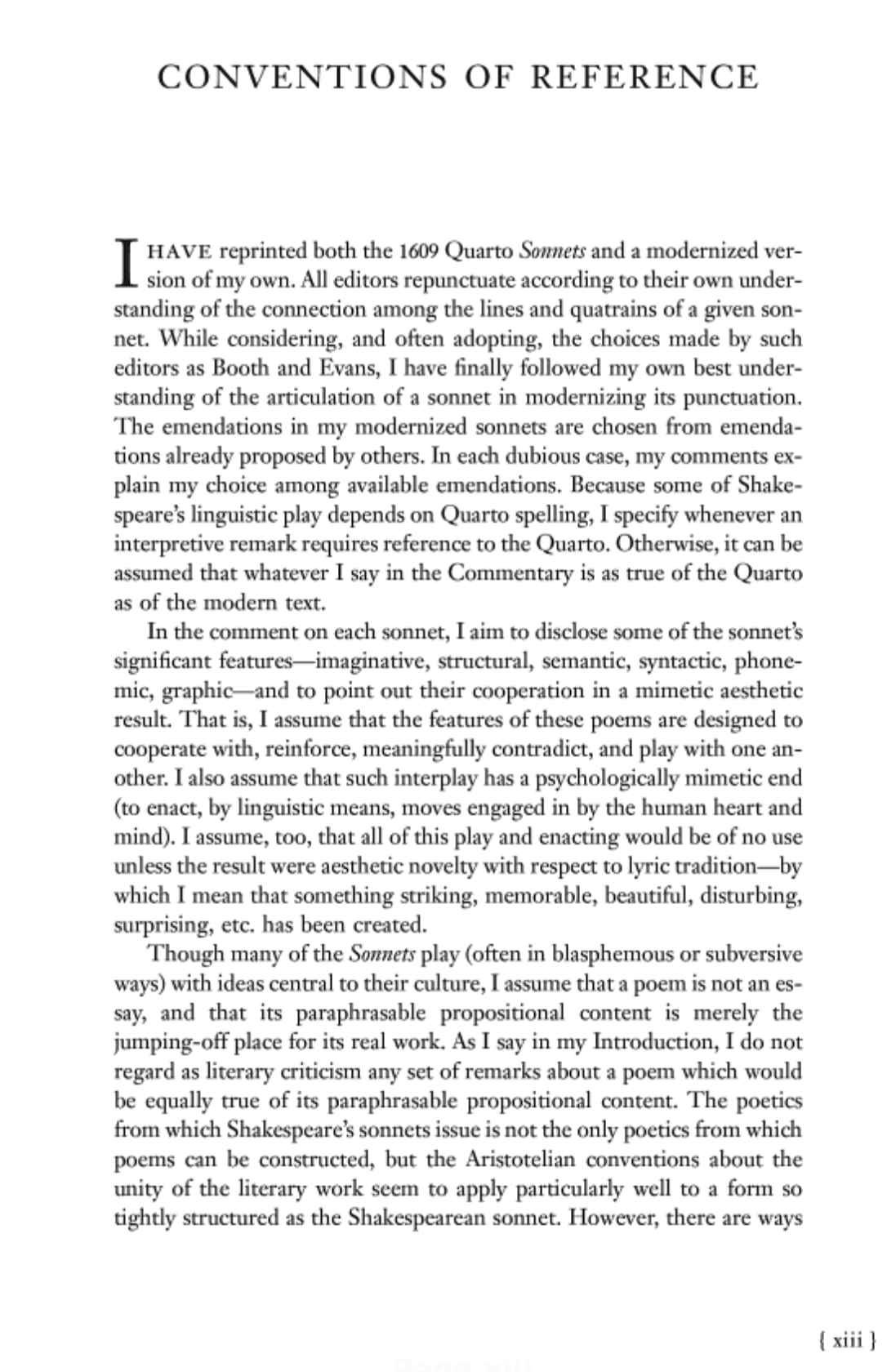
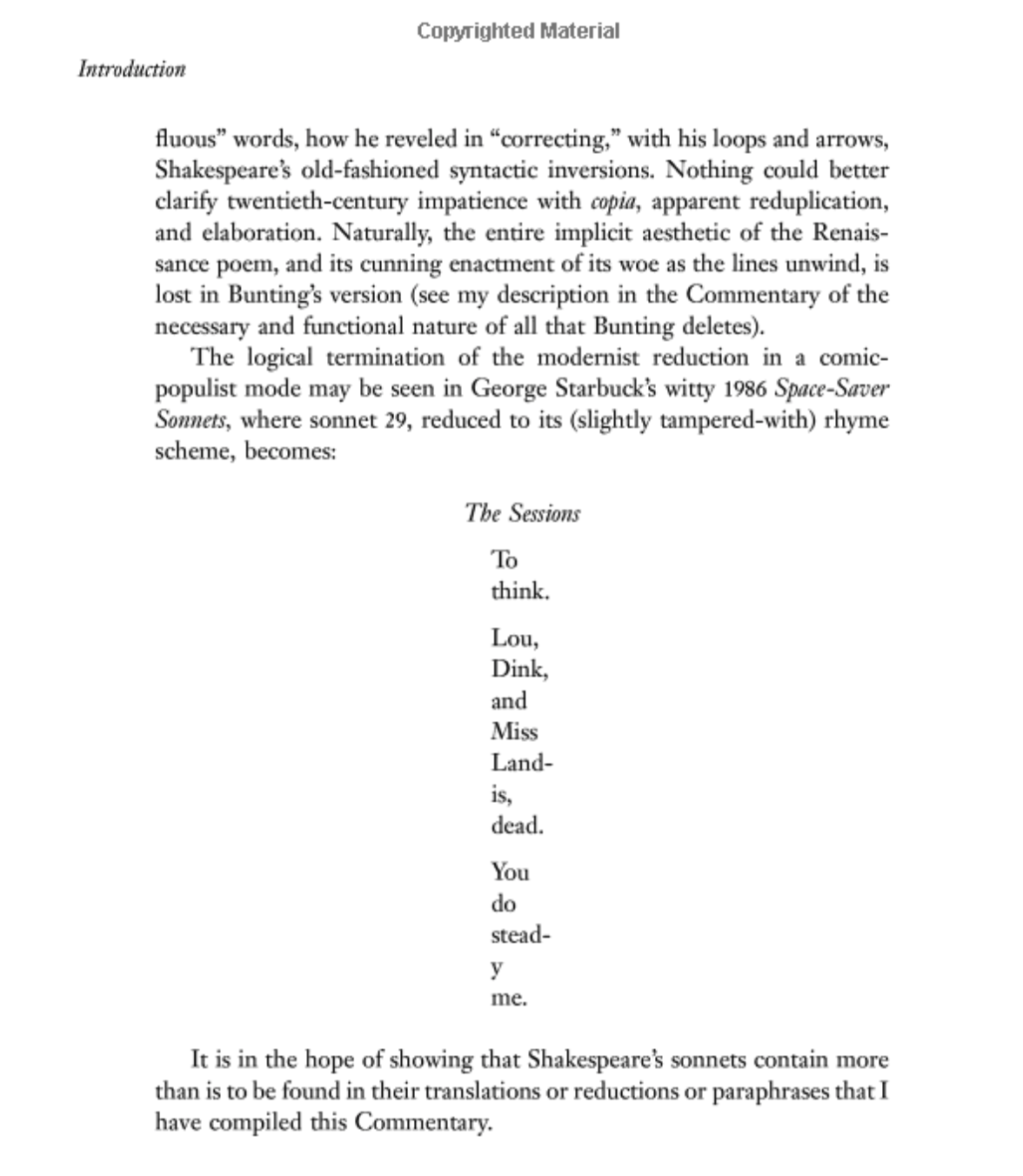

Helen Vendler, The Art of Shakespeare's Sonnets (1977)
April 26 Critic as Ho(st)LY FoOl Either You Criss or You Cross (Out or Off)
Required Reading:
GEORGE HERBERT, "LOVE (III)"
“The Real Presence of Absent Puns: George Herbert’s ‘Love (III),’” in Shakespeare Up Close: Reading Early Modern Texts, ed. Nicholas Nace, Russ McDonald, and Travis D. Williams (London: Arden Shakespeare, 2013), pp. 76-83.
Recommended Reading:
Prayer and Power- George Herbert and Renaissance Courtship
NOTHING BELOW IS REQUIRED FOR THIS COURSE. YOU MAY IGNORE IT ALL.
Vincent Lloyd, A Black Professor Trapped in Anti-Racist Hell February 10, 2023
Maria Parrino, “His Master’s Voice: Sound Devices in Bram Stoker’s Dracula
« La voix de son maître » : dispositifs sonores dans Dracula de Bram Stoker
https://doi.org/10.4000/cve.9789
Jennifer Wicke. "Vampiric Typewriting: Dracula and Its Media." ELH, Vol. 59, No. 2 (Summer, 1992), pp. 467-493.
Avital Ronell. The Telephone Book. Technology, Schizophrenia, Electric Speech. 484 pages. Illus. Paperback. July 1991
Laurence Rickels. The Vampire Lectures. University of Minnesota Press 1999
Andreas Sommer, “Psychical research and the Origins of American Psychology: Hugo Münsterberg, William James and Eusapia Palladino,” in Hist Human Sci. 2012 April 25 (2): 23–44.
https://www.ncbi.nlm.nih.gov/pmc/articles/PMC3552602/
The very enterprise of appropriating meaning is thus reveal- ed to be the strict appropriation of precisely nothing-nothing alive, at least: "le demontage impie de la fiction et consequemment du mecanisme litteraire," writes Mallarme, "pour etaler la piece prin- cipale ou rien (...) le conscient manque chez nous de ce qui la-haut eclate." 47
47 "The impious dismantling of fiction and consequently of the literary mechanism as such in an effort to display the principal part or nothing, (...) the conscious lack(s) within us of what, above, bursts out and splits": Mallarme, La Musique et les Lettres, in Oeuvres Completes (Paris: PlMiade, 1945), p. 647; my translation.
174
In order to include all students in class discussion, and in order to make it easier for you to read closely and thereby improve your own writing, I have changed our discussion format for the rest of the semester. We will close read the assigned text sentence by sentence, the way we read the autobiographical story Freud tells in his essay on Gradiva earlier this semester. Discussion co-leaders and I will call on a student at random and ask that student to read a specific sentence out loud and then to close read it. If the student is unable to read the sentence closely, the co-leaders will call on another student and ask that student to read a specific sentence out loud and then to close read it. We will continue to discuss the same sentence until a student reads it closely. We will then proceed in the same fashion with the next sentence. And so on. Due to time constraints and because close reading is slow reading, we will skip parts of the assigned text, but we will always be talking and only be talking about words, syntax, punctuation, paragraphing, and narration in the text. As we move through the text, we will be able to make more general comments about parts of it. If students have comments to add on the sentence under discussion, they may raise their hands and make them once they have been called on by the co-leaders or me.
In order to learn the names of all the students in the class, I will call roll at the beginning of class. As I state on the requirements webpage, if you are late to class, I consider you absent.
Here is what I have written on the requirements webpage:
"Attendance means not only being in class, but includes completing the assigned work for each class by the time it is due and arriving to class on time. (If you arrive late to class or if you don't do the discussion questions, you are counted as absent.)
I will be asking you to learn how to do something no one may ever have asked you to do: it's called close reading. (Please do not confuse being moralistic and judgmental--"it didn't do 'x' and it should have done!"--with being critical--"why is the work doing what it is doing the way it is doing it?")."
Close reading means paying attention to language, to the words the author has used, the order in which they are used, and appreciating how well they are used. It means paying attention not to what is said but to how it is said; it means paying attention to the structure of sentences and the structure of the narrative; it means paying attention to tropes such as metaphor, metonymy, and irony, among others; it means being alert to allusions a work of literature makes to other works of literature.
See Cleanth Brooks, "The Heresy of Paraphrase," in The Well-Wrought Urn.
Close reading is a practice designed for literature, for texts that are extremely well-written. Literature is universal. Literature is often difficult to write. And it is often difficult to read. Not just anyone can write it. And not just anyone can read it closely. (If you do not know how to write a grammatical sentence or how to punctuate or how to use words correctly, you cannot learn how to read closely.) All writers of literature are excellent close readers. They know humongous amounts of (big) words.
Let me remind you of the format for discussion questions:
Example of the word document format for discussion questions due Mondays by 5:00 p.m.:
Your name in the upper left corner.
1. (Give the page number(s) or quote enough of the text for us to be able to find the passage you are discussing)
2. (Give the page number(s) or quote enough of the text for us to be able to find the passage you are discussing)
Three Big Words (on each assigned reading)
a. Write down the word and give the definition. Cut and paste the sentence where the word is used.
b. Write down the word and give the definition. Cut and paste the sentence where the word is used.
NOTE: Your discussions questions are limited to the texts and films. Do not use them as prompts to talk about something else. Ask about the formal structures of the texts and films, not about the author or historical context. Do not ask speculative questions. They cannot be answered and so are not productive for discussion.
And all the movement Charlotte Brontë remarks, from her own experience, that the writer says more than he knows, and is emphatic that this was the case with Emily. "Having formed these beings, she did not know what she had done." Of course this strikes us as no more than common sense, though Charlotte chooses to attribute it to Emily's ignorance of the world. A narrative is not a transcription of something pre-existent. And this is precisely the situation represented by Lockwood's play with the names he does not understand, his constituting out of any scribbles, a rebus for the plot of the novel he's involved in. The situation indicates the kind of work we must do when a narrative opens itself to us, and contains information in excess of what generic probability requires."
--Frank Kermode, "A Modern Way with the Classic"
New Literary History Vol. 5, No. 3 (Spring, 1974), pp. 415-434; pp. 419-20 (Bolded emphases, mine)
Sigmund Freud, Delusion and Dream An Interpretation in the Light of Psychoanalysis of Gradiva, Parts II, III, IV, and the postscript to the second edition, pp. 41-95
Recommended Reading:
Radical misreading of Freud's essay by Marianna Torgovnick in Gone Primitive: Savage Intellects, Modern Lives, p. 208. The basis of her criticism of Freud is her misspelling of "Gradiva" as "Gravida."
Jacques Derrida, "Archive Fever: A Freudian Impression," pp. 53-60
Daniel Orrells, "Derrida's Impression of Gradiva: Archive Fever and Antiquity," in Derrida and Antiquity

Predatory Reading vs. Literary Criticism


How to Read a Book 1940 edition
How to Read a Book 1966 edition
How To Read A Book 1972 Edition
John T. Irwin ,"Mysteries We Reread, Mysteries of Rereading: Poe, Borges, and the Analytic Detective Story; Also Lacan, Derrida, and Johnson" MLN, Vol. 101, No. 5, Comparative Literature (Dec., 1986), pp. 1168- 1215
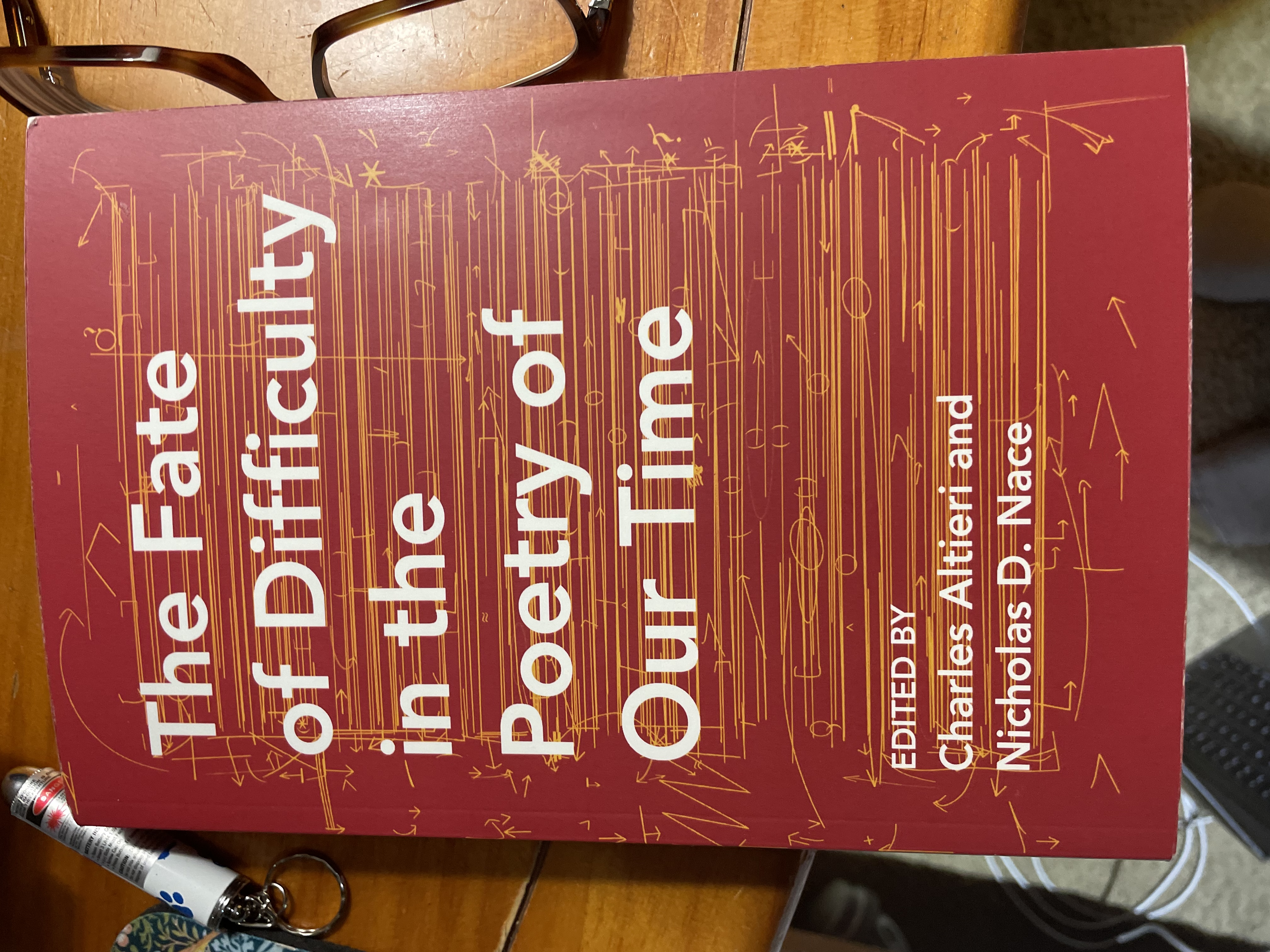
Cody Rose Clevidence, Dearth & God's Green Mirth (2022)
John Milton, Paradise Lost (1667 edition) / (1688 edition)
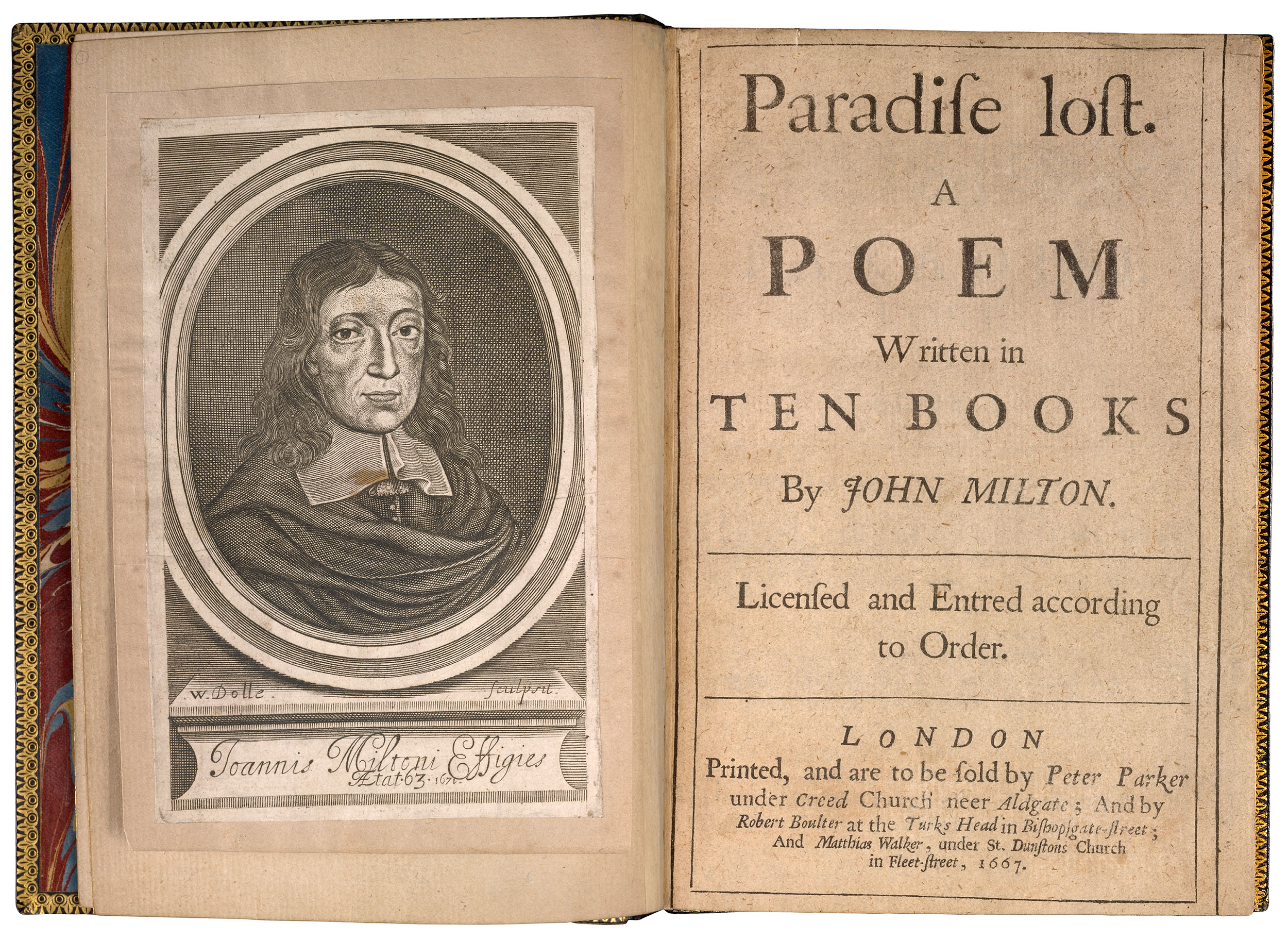
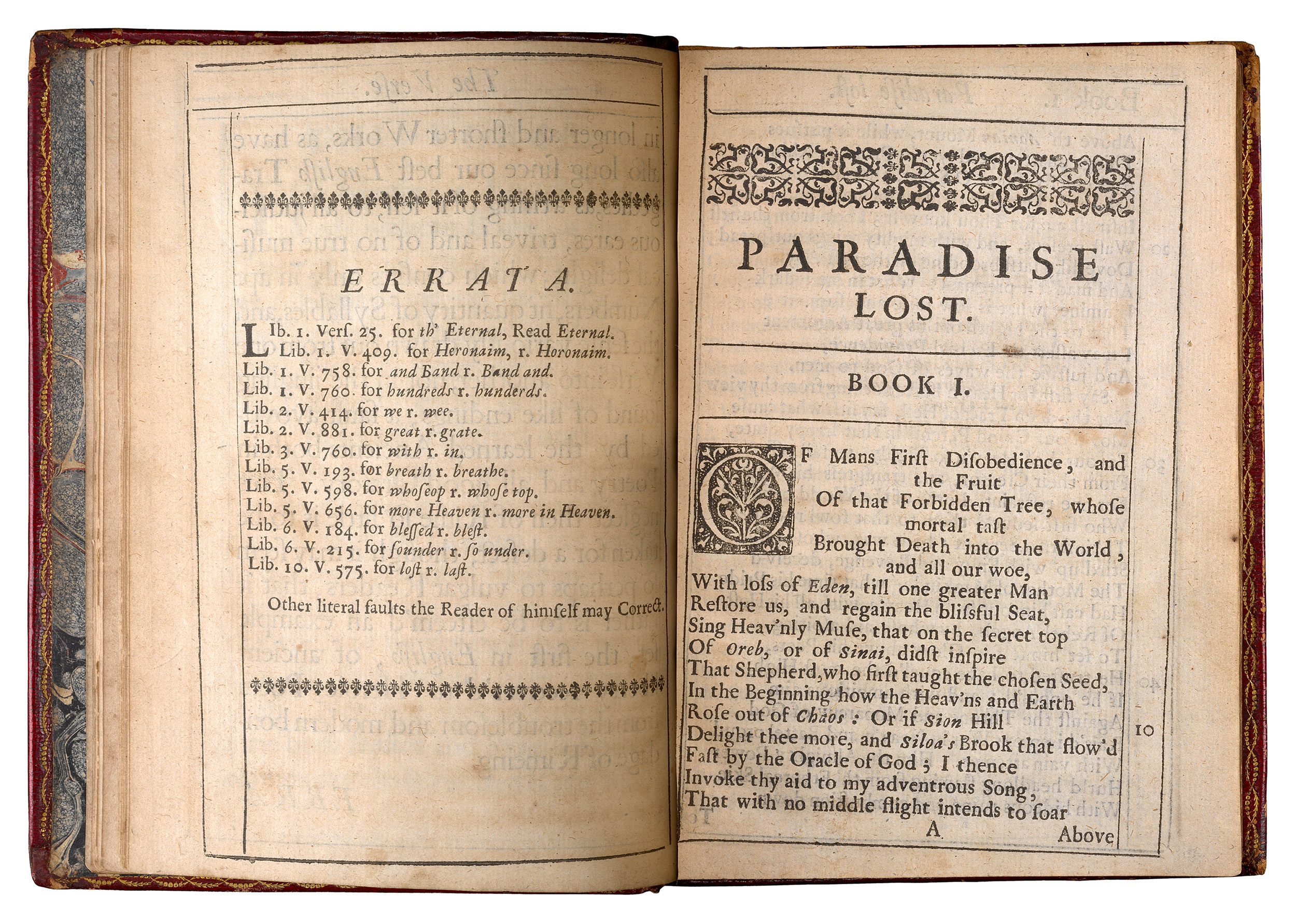
Salon des Refusés (1863)
JAMES SMITH & HORACE SMITH, REJECTED ADDRESSES: OR, THE NEW THEATRUM POETARUM (1833)
William McGinn, "Don Juan Unread" (1819)
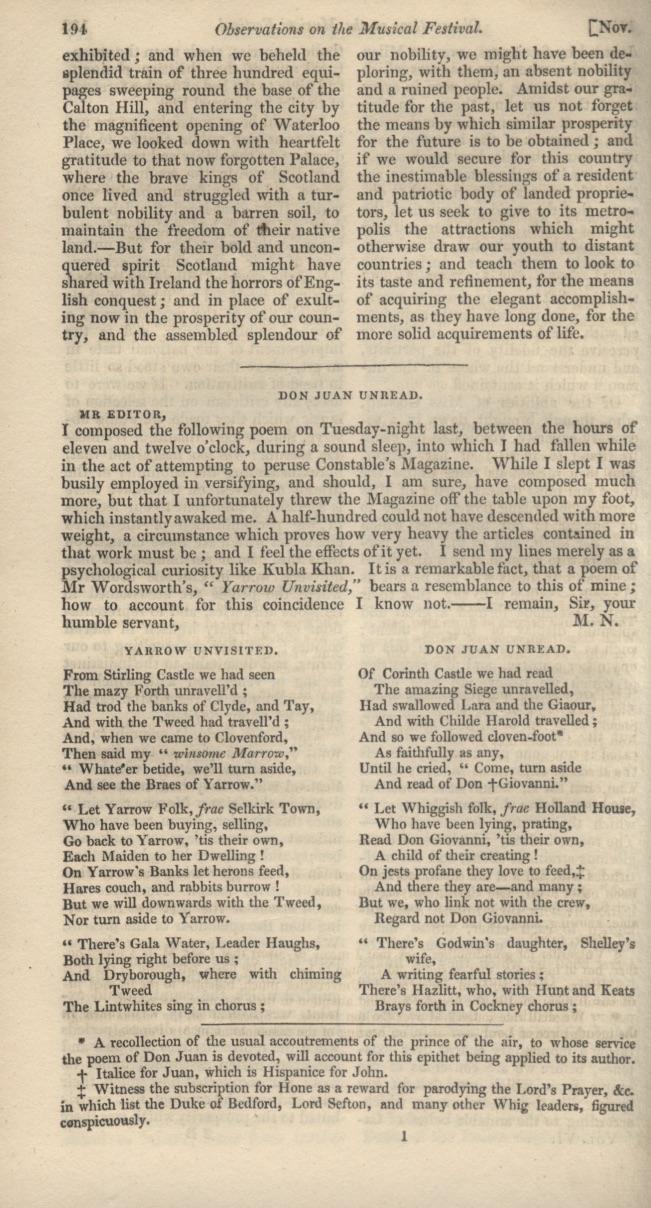
"As gross we read, as where's the need, / To wade through Don Giovanni."
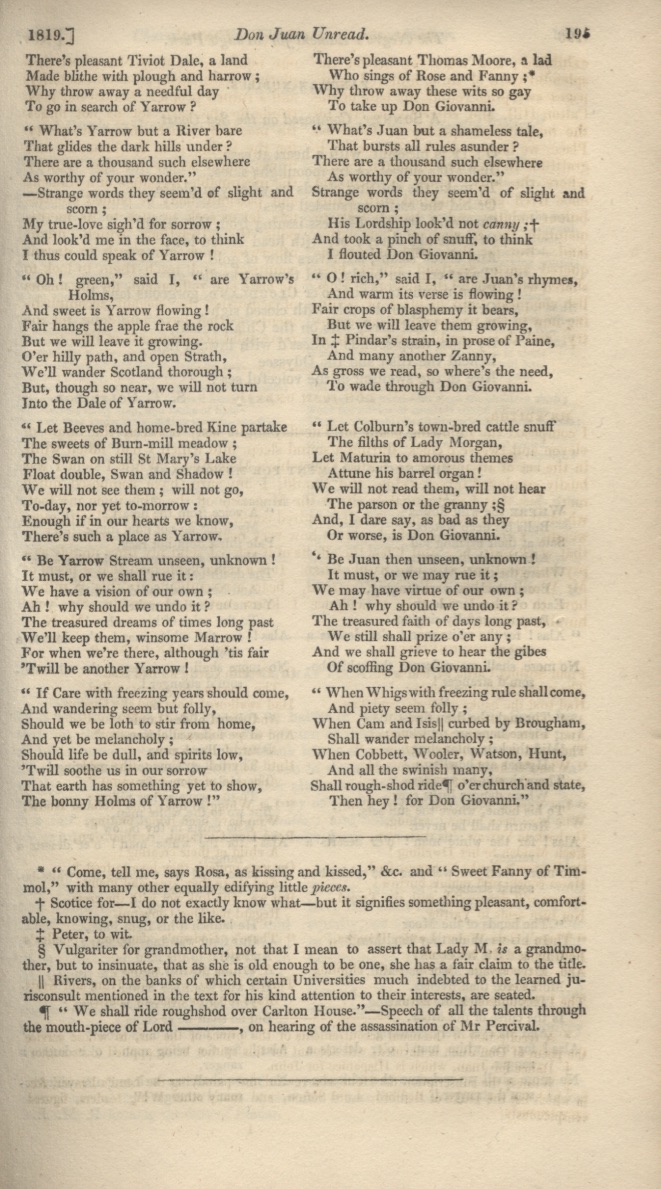
Lord Byron, Don Juan (1859)

Laurence Sterne, Tristram Shandy, "Excummunicato" Dashed Out Writing



The Wife of Bath as one of the first cancellers of literature. Holy Fire
Wife of Bath tale book burning destruction
Reading for pleasure Chaucer
587 Whan that my fourthe housbonde was on beere,
When my fourth husband was on the funeral bier,
588 I weep algate, and made sory cheere,
I wept continuously, and acted sorry,
589 As wyves mooten, for it is usage,
As wives must do, for it is the custom,
590 And with my coverchief covered my visage,
And with my kerchief covered my face,
591 But for that I was purveyed of a make,
But because I was provided with a mate,
592 I wepte but smal, and that I undertake.
I wept but little, and that I affirm.
593 To chirche was myn housbonde born a-morwe
To church was my husband carried in the morning
594 With neighebores, that for hym maden sorwe;
By neighbors, who for him made sorrow;
595 And Jankyn, oure clerk, was oon of tho.
And Jankin, our clerk, was one of those.
596 As help me God, whan that I saugh hym go
As help me God, when I saw him go
597 After the beere, me thoughte he hadde a paire
After the bier, I thought he had a pair
598 Of legges and of feet so clene and faire
Of legs and of feet so neat and fair
599 That al myn herte I yaf unto his hoold.
That all my heart I gave unto his keeping.
600 He was, I trowe, twenty wynter oold,
He was, I believe, twenty years old,
601 And I was fourty, if I shal seye sooth;
And I was forty, if I shall tell the truth;
602 But yet I hadde alwey a coltes tooth.
But yet I had always a colt's tooth.
603 Gat-tothed I was, and that bicam me weel;
With teeth set wide apart I was, and that became me well;
604 I hadde the prente of seinte Venus seel.
I had the print of Saint Venus's seal.
605 As help me God, I was a lusty oon,
As help me God, I was a lusty one,
606 And faire, and riche, and yong, and wel bigon,
And fair, and rich, and young, and well fixed,
607 And trewely, as myne housbondes tolde me,
And truly, as my husbands told me,
608 I hadde the beste quoniam myghte be.
I had the best pudendum that might be.
609 For certes, I am al Venerien
For certainly, I am all influenced by Venus
610 In feelynge, and myn herte is Marcien.
In feeling, and my heart is influenced by Mars.
611 Venus me yaf my lust, my likerousnesse,
Venus me gave my lust, my amorousness,
612 And Mars yaf me my sturdy hardynesse;
And Mars gave me my sturdy boldness;
613 Myn ascendent was Taur, and Mars therinne.
My ascendant was Taurus, and Mars was therein.
614 Allas, allas! That evere love was synne!
Alas, alas! That ever love was sin!
615 I folwed ay myn inclinacioun
I followed always my inclination
616 By vertu of my constellacioun;
By virtue of the state of the heavens at my birth;
617 That made me I koude noght withdrawe
That made me that I could not withdraw
618 My chambre of Venus from a good felawe.
My chamber of Venus from a good fellow.
619 Yet have I Martes mark upon my face,
Yet have I Mars' mark upon my face,
620 And also in another privee place.
And also in another private place.
621 For God so wys be my savacioun,
For as God may be my salvation,
622 I ne loved nevere by no discrecioun,
I never loved in moderation,
623 But evere folwede myn appetit,
But always followed my appetite,
624 Al were he short, or long, or blak, or whit;
Whether he were short, or tall, or black-haired, or blond;
625 I took no kep, so that he liked me,
I took no notice, provided that he pleased me,
626 How poore he was, ne eek of what degree.
How poor he was, nor also of what rank.
627 What sholde I seye but, at the monthes ende,
What should I say but, at the month's end,
628 This joly clerk, Jankyn, that was so hende,
This jolly clerk, Jankin, that was so courteous,
629 Hath wedded me with greet solempnytee,
Has wedded me with great solemnity,
630 And to hym yaf I al the lond and fee
And to him I gave all the land and property
631 That evere was me yeven therbifoore.
That ever was given to me before then.
632 But afterward repented me ful soore;
But afterward I repented very bitterly;
633 He nolde suffre nothyng of my list.
He would not allow me anything of my desires.
634 By God, he smoot me ones on the lyst,
By God, he hit me once on the ear,
635 For that I rente out of his book a leef,
Because I tore a leaf out of his book,
636 That of the strook myn ere wax al deef.
So that of the stroke my ear became all deaf.
637 Stibourn I was as is a leonesse,
I was as stubborn as is a lioness,
638 And of my tonge a verray jangleresse,
And of my tongue a true chatterbox,
639 And walke I wolde, as I had doon biforn,
And I would walk, as I had done before,
640 From hous to hous, although he had it sworn;
From house to house, although he had sworn the contrary;
641 For which he often tymes wolde preche,
For which he often times would preach,
642 And me of olde Romayn geestes teche;
And teach me of old Roman stories;
643 How he Symplicius Gallus lefte his wyf,
How he, Simplicius Gallus, left his wife,
644 And hire forsook for terme of al his lyf,
And forsook her for rest of all his life,
645 Noght but for open-heveded he hir say
Because of nothing but because he saw her bare-headed
646 Lookynge out at his dore upon a day.
Looking out at his door one day.
647 Another Romayn tolde he me by name,
Another Roman he told me by name,
648 That, for his wyf was at a someres game
Who, because his wife was at a midsummer revel
649 Withouten his wityng, he forsook hire eke.
Without his knowledge, he forsook her also.
650 And thanne wolde he upon his Bible seke
And then he would seek in his Bible
651 That ilke proverbe of Ecclesiaste
That same proverb of Ecclesiasticus
652 Where he comandeth and forbedeth faste
Where he commands and strictly forbids that
653 Man shal nat suffre his wyf go roule aboute.
Man should suffer his wife go wander about.
654 Thanne wolde he seye right thus, withouten doute:
Then would he say right thus, without doubt:
655 `Whoso that buyldeth his hous al of salwes,
`Whoever builds his house all of willow twigs,
656 And priketh his blynde hors over the falwes,
And spurs his blind horse over the open fields,
657 And suffreth his wyf to go seken halwes,
And suffers his wife to go on pilgrimages,
658 Is worthy to been hanged on the galwes!'
Is worthy to be hanged on the gallows!'
659 But al for noght, I sette noght an hawe
But all for nothing, I gave not a hawthorn berry
660 Of his proverbes n' of his olde sawe,
For his proverbs nor for his old sayings,
661 Ne I wolde nat of hym corrected be.
Nor would I be corrected by him.
662 I hate hym that my vices telleth me,
I hate him who tells me my vices,
663 And so doo mo, God woot, of us than I.
And so do more of us, God knows, than I.
664 This made hym with me wood al outrely;
This made him all utterly furious with me;
665 I nolde noght forbere hym in no cas.
I would not put up with him in any way.
666 Now wol I seye yow sooth, by Seint Thomas,
Now will I tell you the truth, by Saint Thomas,
667 Why that I rente out of his book a leef,
Why I tore a leaf out of his book,
668 For which he smoot me so that I was deef.
For which he hit me so hard that I was deaf.
669 He hadde a book that gladly, nyght and day,
He had a book that regularly, night and day,
670 For his desport he wolde rede alway;
For his amusement he would always read;
671 He cleped it Valerie and Theofraste,
He called it Valerie and Theofrastus,
672 At which book he lough alwey ful faste.
At which book he always heartily laughed.
673 And eek ther was somtyme a clerk at Rome,
And also there was once a clerk at Rome,
674 A cardinal, that highte Seint Jerome,
A cardinal, who is called Saint Jerome,
675 That made a book agayn Jovinian;
That made a book against Jovinian;
676 In which book eek ther was Tertulan,
In which book also there was Tertullian,
677 Crisippus, Trotula, and Helowys,
Crisippus, Trotula, and Heloise,
678 That was abbesse nat fer fro Parys,
Who was abbess not far from Paris,
679 And eek the Parables of Salomon,
And also the Parables of Salomon,
680 Ovides Art, and bookes many on,
Ovid's Art, and many other books,
681 And alle thise were bounden in o volume.
And all these were bound in one volume.
682 And every nyght and day was his custume,
And every night and day was his custom,
683 Whan he hadde leyser and vacacioun
When he had leisure and spare time
684 From oother worldly occupacioun,
From other worldly occupations,
685 To reden on this book of wikked wyves.
To read in this book of wicked wives.
686 He knew of hem mo legendes and lyves
He knew of them more legends and lives
687 Than been of goode wyves in the Bible.
Than are of good women in the Bible.
688 For trusteth wel, it is an impossible
For trust well, it is an impossibility
689 That any clerk wol speke good of wyves,
That any clerk will speak good of women,
690 But if it be of hooly seintes lyves,
Unless it be of holy saints' lives,
691 Ne of noon oother womman never the mo.
Nor of any other woman in any way.
692 Who peyntede the leon, tel me who?
Who painted the lion, tell me who?
693 By God, if wommen hadde writen stories,
By God, if women had written stories,
694 As clerkes han withinne hire oratories,
As clerks have within their studies,
695 They wolde han writen of men moore wikkednesse
They would have written of men more wickedness
696 Than al the mark of Adam may redresse.
Than all the male sex could set right.
697 The children of Mercurie and of Venus
The children of Mercury (clerks) and of Venus (lovers)
698 Been in hir wirkyng ful contrarius;
Are directly contrary in their actions;
699 Mercurie loveth wysdam and science,
Mercury loves wisdom and knowledge,
700 And Venus loveth ryot and dispence.
And Venus loves riot and extravagant expenditures.
701 And, for hire diverse disposicioun,
And, because of their diverse dispositions,
702 Ech falleth in otheres exaltacioun.
Each falls in the other's most powerful astronomical sign.
703 And thus, God woot, Mercurie is desolat
And thus, God knows, Mercury is powerless
704 In Pisces, wher Venus is exaltat,
In Pisces (the Fish), where Venus is exalted,
705 And Venus falleth ther Mercurie is reysed.
And Venus falls where Mercury is raised.
706 Therfore no womman of no clerk is preysed.
Therefore no woman is praised by any clerk.
707 The clerk, whan he is oold, and may noght do
The clerk, when he is old, and can not do
708 Of Venus werkes worth his olde sho,
Any of Venus's works worth his old shoe,
709 Thanne sit he doun, and writ in his dotage
Then he sits down, and writes in his dotage
710 That wommen kan nat kepe hir mariage!
That women can not keep their marriage!
711 But now to purpos, why I tolde thee
But now to the point, why I told thee
712 That I was beten for a book, pardee!
That I was beaten for a book, by God!
713 Upon a nyght Jankyn, that was oure sire,
Upon a night Jankin, that was master of our house,
714 Redde on his book, as he sat by the fire,
Read on his book, as he sat by the fire,
715 Of Eva first, that for hir wikkednesse
Of Eve first, how for her wickedness
716 Was al mankynde broght to wrecchednesse,
All mankind was brought to wretchedness,
717 For which that Jhesu Crist hymself was slayn,
For which Jesus Christ himself was slain,
718 That boghte us with his herte blood agayn.
Who bought us back with his heart's blood.
719 Lo, heere expres of womman may ye fynde
Lo, here clearly of woman you may find
720 That womman was the los of al mankynde.
That woman was the cause of the loss of all mankind.
721 Tho redde he me how Sampson loste his heres:
Then he read me how Sampson lost his hair:
722 Slepynge, his lemman kitte it with hir sheres;
Sleeping, his lover cut it with her shears;
723 Thurgh which treson loste he bothe his yen.
Through which treason he lost both his eyes.
724 Tho redde he me, if that I shal nat lyen,
Then he read to me, if I shall not lie,
725 Of Hercules and of his Dianyre,
Of Hercules and of his Dianyre,
726 That caused hym to sette hymself afyre.
Who caused him to set himself on fire.
727 No thyng forgat he the care and the wo
He forgot not a bit of the care and the woe
728 That Socrates hadde with his wyves two,
That Socrates had with his two wives,
729 How Xantippa caste pisse upon his heed.
How Xantippa caste piss upon his head.
730 This sely man sat stille as he were deed;
This poor man sat still as if he were dead;
731 He wiped his heed, namoore dorste he seyn,
He wiped his head, no more dared he say,
732 But `Er that thonder stynte, comth a reyn!'
But `Before thunder stops, there comes a rain!'
733 Of Phasipha, that was the queene of Crete,
Of Phasipha, that was the queen of Crete,
734 For shrewednesse, hym thoughte the tale swete;
For sheer malignancy, he thought the tale sweet;
735 Fy! Spek namoore -- it is a grisly thyng --
Fie! Speak no more -- it is a grisly thing --
736 Of hire horrible lust and hir likyng.
Of her horrible lust and her pleasure.
737 Of Clitermystra, for hire lecherye,
Of Clitermystra, for her lechery,
738 That falsly made hire housbonde for to dye,
That falsely made her husband to die,
739 He redde it with ful good devocioun.
He read it with very good devotion.
740 He tolde me eek for what occasioun
He told me also for what occasion
741 Amphiorax at Thebes loste his lyf.
Amphiorax at Thebes lost his life.
742 Myn housbonde hadde a legende of his wyf,
My husband had a legend of his wife,
743 Eriphilem, that for an ouche of gold
Eriphilem, that for a brooch of gold
744 Hath prively unto the Grekes told
Has secretly unto the Greeks told
745 Wher that hir housbonde hidde hym in a place,
Where her husband hid him in a place,
746 For which he hadde at Thebes sory grace.
For which he had at Thebes a sad fate.
747 Of Lyvia tolde he me, and of Lucye:
Of Livia told he me, and of Lucie:
748 They bothe made hir housbondes for to dye,
They both made their husbands to die,
749 That oon for love, that oother was for hate.
That one for love, that other was for hate.
750 Lyvia hir housbonde, on an even late,
Livia her husband, on a late evening,
751 Empoysoned hath, for that she was his fo;
Has poisoned, because she was his foe;
752 Lucia, likerous, loved hire housbonde so
Lucia, lecherous, loved her husband so much
753 That, for he sholde alwey upon hire thynke,
That, so that he should always think upon her,
754 She yaf hym swich a manere love-drynke
She gave him such a sort of love-drink
755 That he was deed er it were by the morwe;
That he was dead before it was morning;
756 And thus algates housbondes han sorwe.
And thus always husbands have sorrow.
757 Thanne tolde he me how oon Latumyus
Then he told me how one Latumius
758 Compleyned unto his felawe Arrius
Complained unto his fellow Arrius
759 That in his gardyn growed swich a tree
That in his garden grew such a tree
760 On which he seyde how that his wyves thre
On which he said how his three wives
761 Hanged hemself for herte despitus.
Hanged themselves for the malice of their hearts
762 `O leeve brother,' quod this Arrius,
`O dear brother,' this Arrius said,
763 `Yif me a plante of thilke blissed tree,
`Give me a shoot of that same blessed tree,
764 And in my gardyn planted shal it bee.'
And in my garden shall it be planted.'
765 Of latter date, of wyves hath he red
Of latter date, of wives has he read
766 That somme han slayn hir housbondes in hir bed,
That some have slain their husbands in their bed,
767 And lete hir lecchour dighte hire al the nyght,
And let her lecher copulate with her all the night,
768 Whan that the corps lay in the floor upright.
When the corpse lay in the floor flat on its back.
769 And somme han dryve nayles in hir brayn,
And some have driven nails in their brains,
770 Whil that they slepte, and thus they had hem slayn.
While they slept, and thus they had them slain.
771 Somme han hem yeve poysoun in hire drynke.
Some have given them poison in their drink.
772 He spak moore harm than herte may bithynke,
He spoke more harm than heart may imagine,
773 And therwithal he knew of mo proverbes
And concerning this he knew of more proverbs
774 Than in this world ther growen gras or herbes.
Than in this world there grow grass or herbs.
775 Betis,'quodhe,Betis,′quodhe,thyn habitacioun
Beeris,'hesaid,Beeris,′hesaid,thy habitation
776 Be with a leon or a foul dragoun,
Be with a lion or a foul dragon,
777 Than with a womman usynge for to chyde.
Than with a woman accustomed to scold.
778 Bet is,' quod he, `hye in the roof abyde,
Better is,' he said, `to stay high in the roof,
779 Than with an angry wyf doun in the hous;
Than with an angry wife down in the house;
780 They been so wikked and contrarious,
They are so wicked and contrary,
781 They haten that hir housbondes loven ay.'
They always hate what their husbands love.'
782 He seyde, `A womman cast hir shame away,
He said, `A woman casts their shame away,
783 Whan she cast of hir smok'; and forthermo,
When she casts off her undergarment'; and furthermore,
784 `A fair womman, but she be chaast also,
`A fair woman, unless she is also chaste,
785 Is lyk a gold ryng in a sowes nose.'
Is like a gold ring in a sow's nose.'
786 Who wolde wene, or who wolde suppose,
Who would believe, or who would suppose,
787 The wo that in myn herte was, and pyne?
The woe that in my heart was, and pain?
788 And whan I saugh he wolde nevere fyne
And when I saw he would never cease
789 To reden on this cursed book al nyght,
Reading on this cursed book all night,
790 Al sodeynly thre leves have I plyght
All suddenly have I plucked three leaves
791 Out of his book, right as he radde, and eke
Out of his book, right as he read, and also
792 I with my fest so took hym on the cheke
I with my fist so hit him on the cheek
793 That in oure fyr he fil bakward adoun.
That in our fire he fell down backwards.
794 And he up stirte as dooth a wood leoun,
And he leaped up as does a furious lion,
795 And with his fest he smoot me on the heed
And with his fist he hit me on the head
796 That in the floor I lay as I were deed.
That on the floor I lay as if I were dead.
797 And whan he saugh how stille that I lay,
And when he saw how still I lay,
798 He was agast and wolde han fled his way,
He was frightened and would have fled on his way,
799 Til atte laste out of my swogh I breyde.
Until at the last out of my swoon I awoke.
800 `O! hastow slayn me, false theef?' I seyde,
`O! hast thou slain me, false thief?' I said,
801 `And for my land thus hastow mordred me?
`And for my land thus hast thou murdered me?
802 Er I be deed, yet wol I kisse thee.'
Before I am dead, yet will I kiss thee.'
803 And neer he cam, and kneled faire adoun,
And near he came, and kneeled gently down,
804 And seyde, `Deere suster Alisoun,
And said, `Dear sister Alisoun,
805 As help me God, I shal thee nevere smyte!
So help me God, I shall never (again) smite thee!
806 That I have doon, it is thyself to wyte.
What I have done, it is thyself to blame (you drove me to it).
807 Foryeve it me, and that I thee biseke!'
Forgive it me, and that I beseech thee!'
808 And yet eftsoones I hitte hym on the cheke,
And yet immediately I hit him on the cheek,
809 And seyde, `Theef, thus muchel am I wreke;
And said, `Thief, thus much am I avenged;
810 Now wol I dye, I may no lenger speke.'
Now will I die, I may no longer speak.'
811 But atte laste, with muchel care and wo,
But at the last, with much care and woe,
812 We fille acorded by us selven two.
We made an agreement between our two selves.
813 He yaf me al the bridel in myn hond,
He gave me all the control in my hand,
814 To han the governance of hous and lond,
To have the governance of house and land,
815 And of his tonge, and of his hond also;
And of his tongue, and of his hand also;
816 And made hym brenne his book anon right tho.
And made him burn his book immediately right then.
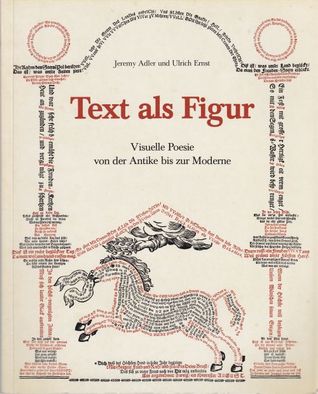
Jeremy Adler and Ulrich Ernst, Ed. Text als Figur: Visuelle Poesie von der Antike bis zur Moderne (1987)
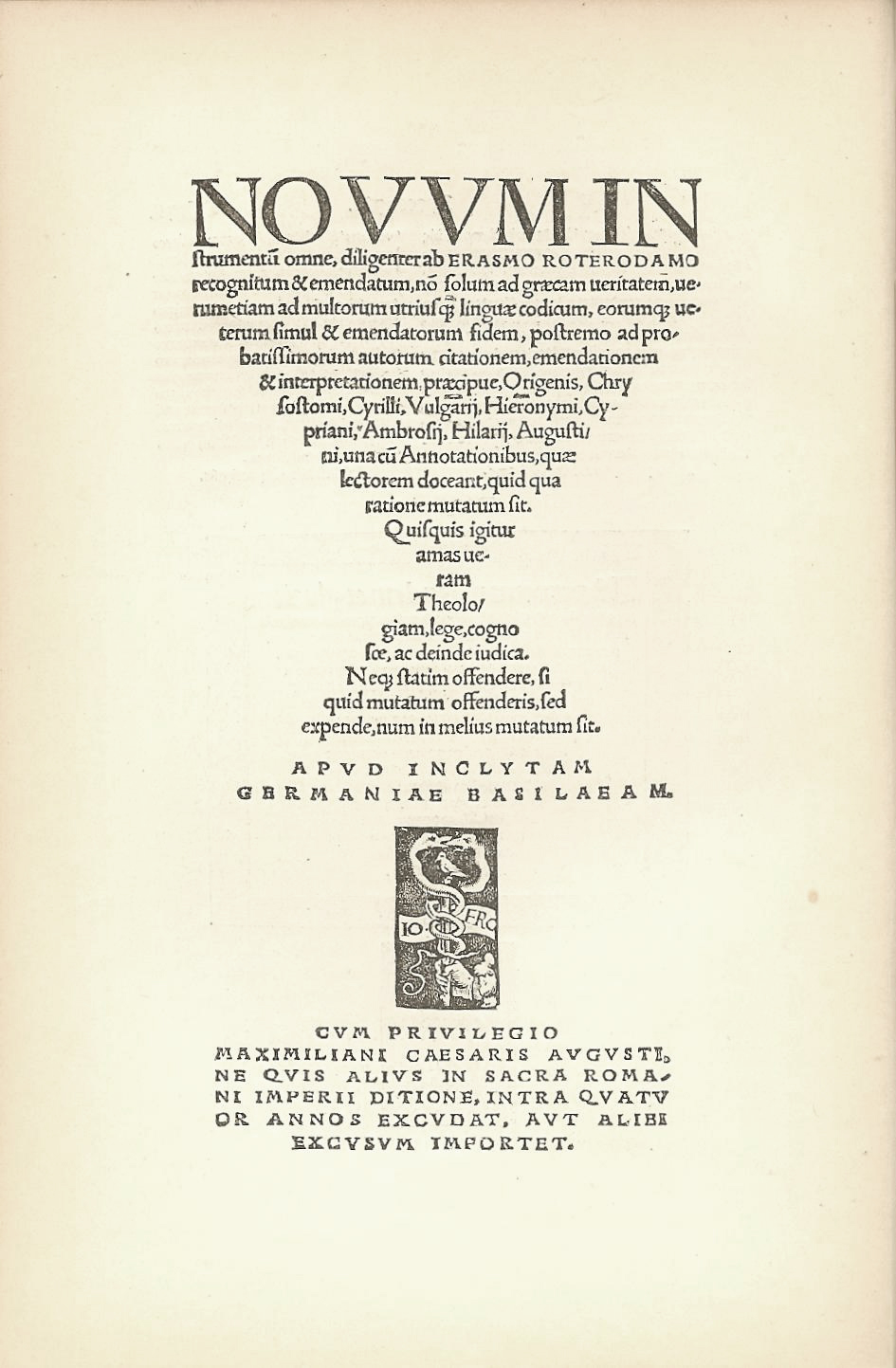
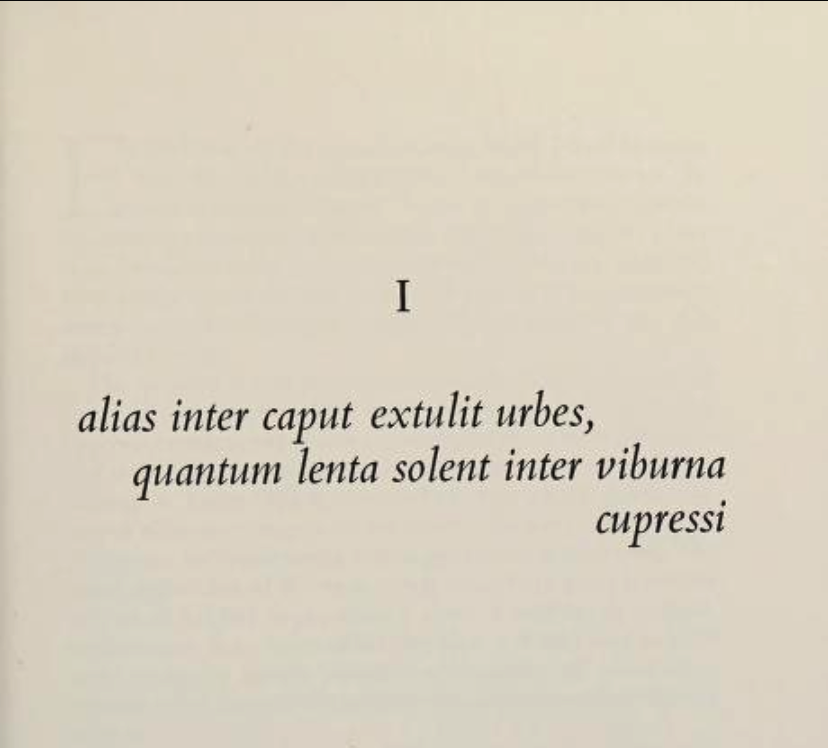
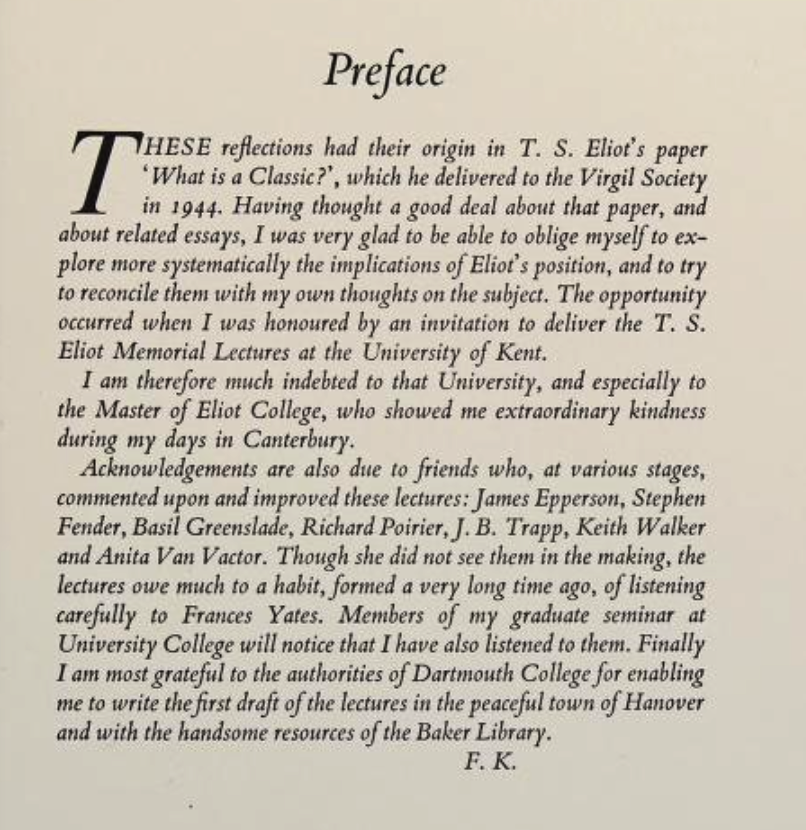
Robert Musil," Chapter 29 and Preface to the Posthumous Papers," The Man Without Qualities Vol 2
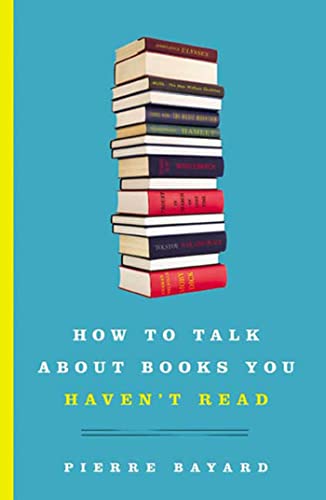
Why you should absolutely be for free speech. Srsly.
'Mighty Ira' Documentary Trailer
Ira Glasser, Free Speech and the ACLU
What is not read? The paratext; notes on the text (Genettic Criticism); missing chapters
What are the limits of the readable--Craig Dworkin, Reading the Illegible
Drafts; graphic design--when writing becomes art (the art book)
The invisible (ink)
What is a damaged book?
Assign I. A. Richards, How to Read a Page
What is a page?
AdlerVanDorenHowtoReadaBook.pdf
UsingBiographyEliotMyGodmantherebearsit.pdf
What is a Book?
Heresy of Paraphrase
Intentional Fallacy
But I Digress Parentheses
Jacques Derrida, "Living On" "unreadability" Illlsible
Aporia; the cross-roads (impasse) sous-rature (how it was printed in the English translation)
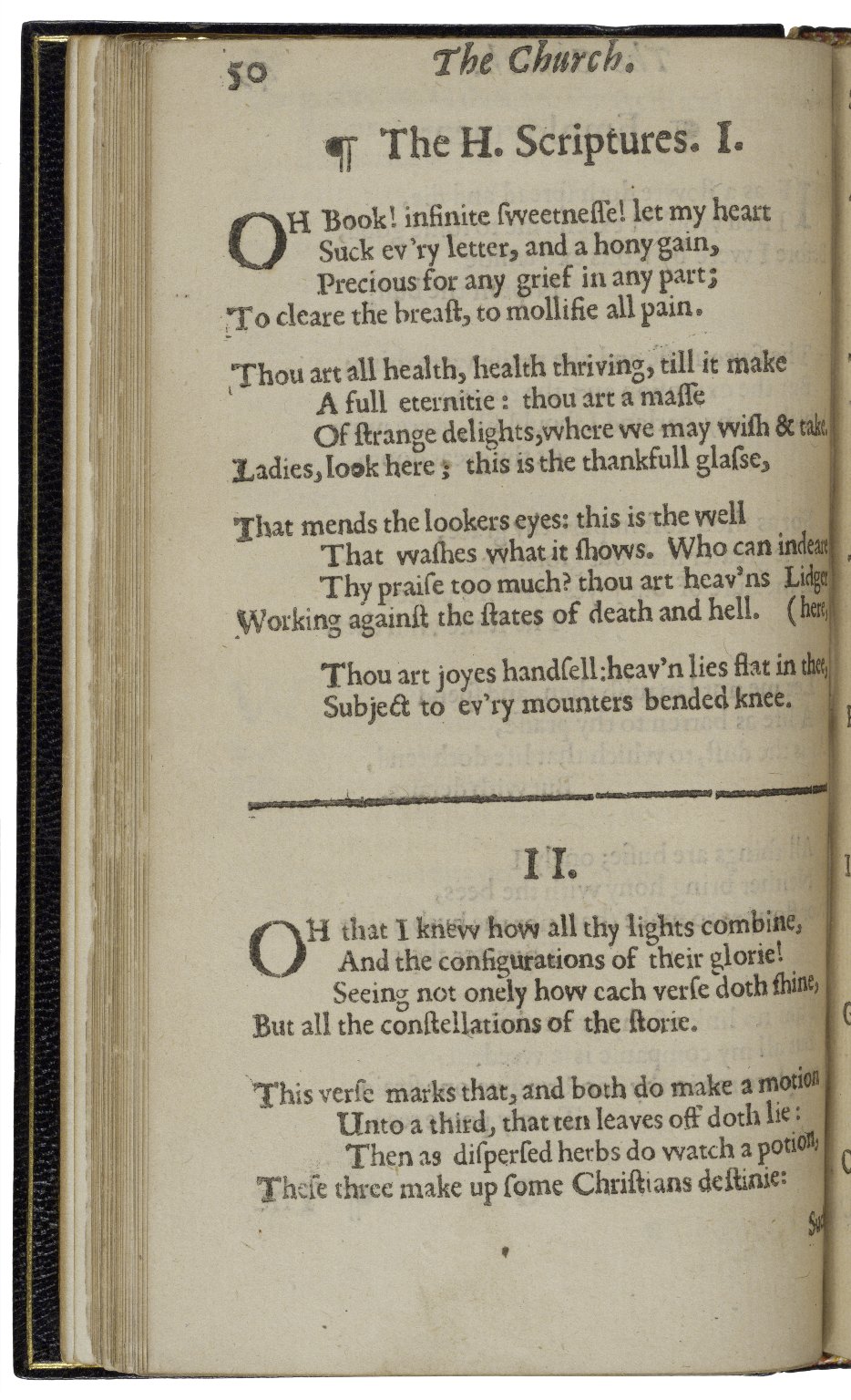
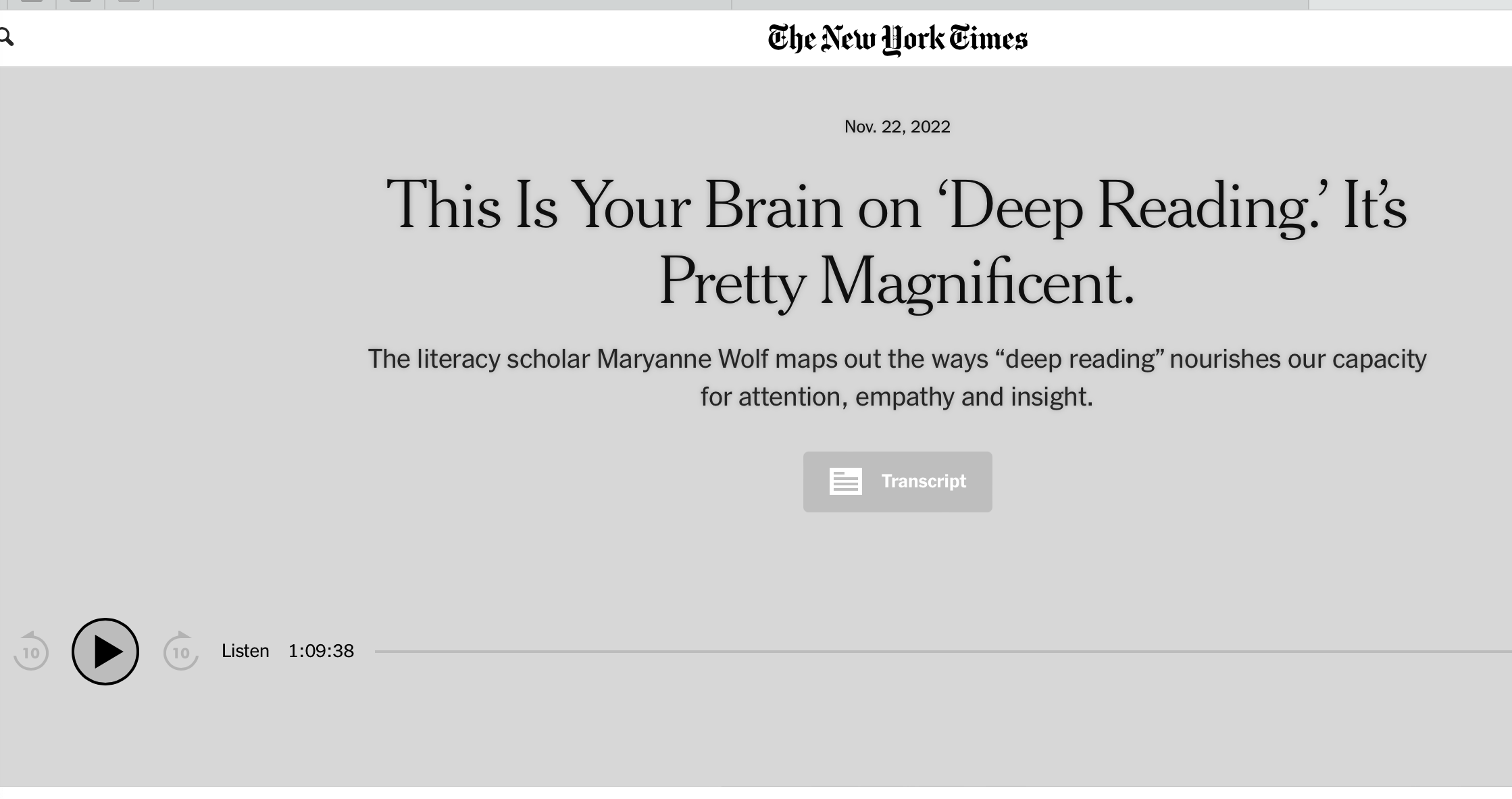
"This is your brain on drugs" PSA
Gérard Genette, Paratexts: Thresholds of Interpretation
Table of Contents pdf of Introduction Here.
Book Art--Mallarme--blank spaces
Punctuation, Blake
Recommended:
Translation, metaphor
Gérard Genette: Seuils. Collection "Poétique". Ed. du Seuil. Paris, 1987. 389p.
JANE AUSTEN’S USE OF ‘WIT’: How Does Jane Austen Use the Word ‘wit’ in her Novels?
Text from British It-Narratives, 1750-1830, vol. 4, ed. Mark Blackwell (Pickering and Chatto, 2012).
The Mind is a Metaphor | Browse the Database
http://metaphors.iath.virginia.edu/metaphors
https://www.taylorfrancis.com/chapters/edit/10.4324/9781315228815-11/vide-supplementum-claire-bourne
Jacques Derrida
Translated by Sandra van Reenen and Jacques de Ville
https://www.sas.upenn.edu/~cavitch/pdf-library/DeMan_Autobiography.pdf
William Wordsworth's Essays Upon Epitaphs; John Keats’ “On Sitting Down to Read King Lear Again”; Paul De Man's "Autobiography as Defacement" and “Excuses (Confessions)”
http://oldsite.english.ucsb.edu/faculty/ayliu/unlocked/wordsworth/essays-upon-epitaphs.html
https://www.gutenberg.org/files/16550/16550-h/16550-h.htm#II_UPON_EPITAPHS
Valery, Paul, The Art of Poetry (1938) poetry is like a melody; therefore, poetry cannot be translated
vs. Gerard Genette, Palimpsests (1987) on translation
Aspirational Reading
Poetry is difficult
Cleanth Brooks, "The Heresy of Paraphrase"

"Old romance"
The Red Crosse Knight's dream of Una in Book I of Spenser's The Faerie Queene
He making speedy way through spersed ayre,
And through the world of waters wide and deepe,
To Morpheus house doth hastily repaire.
Amid the bowels of the earth full steepe,
And low, where dawning day doth neuer peepe,
His dwelling is; there Tethys his wet bed
Doth euer wash, and Cynthia still doth steepe
In siluer deaw his euer-drouping hed,
Whiles sad Night ouer him her ma[n]tle black doth spred
Whose double gates he findeth locked fast,
The one faire fram'd of burnisht Yuory,
The other all with siluer ouercast;
And wakefull dogges before them farre do lye,
Watching to banish Care their enimy,
Who oft is wont to trouble gentle Sleepe.
By them the Sprite doth passe in quietly,
And vnto Morpheus comes, whom drowned deepe
In drowsie fit he findes: of nothing he takes keepe.
And more, to lulle him in his slumber soft,
A trickling streame from high rocke tumbling downe
And euer-drizling raine vpon the loft,
Mixt with a murmuring winde, much like the sowne
Of swarming Bees, did cast him in a swowne:
No other noyse, nor peoples troublous cryes,
As still are wont t'annoy the walled towne,
Might there be heard: but carelesse Quiet lyes,
Wrapt in eternall silence farre from enemyes.
The messenger approching to him spake,
But his wast wordes returnd to him in vaine:
So sound he slept, that nought mought him awake.
Then rudely he him thrust, and pusht with paine,
Whereat he gan to stretch: but he againe
Shooke him so hard, that forced him to speake.
As one then in a dreame, whose dryer braine
Is tost with troubled sights and fancies weake,
He mumbled soft, but would not all his silence breake.
The Sprite then gan more boldly him to wake,
And threatned vnto him the dreaded name
Of Hecate: whereat he gan to quake,
And lifting vp his lompish head, with blame
Halfe angry asked him, for what he came.
Hither (quoth he) me Archimago sent,
He that the stubborne Sprites can wisely tame,
He bids thee to him send for his intent
A fit false dreame, that can delude the sleepers sent.
The God obayde, and calling forth straight way
A diuerse dreame out of his prison darke,
Deliuered it to him, and downe did lay
His heauie head, deuoide of carefull carke,
Whose sences all were straight benumbd and starke.
He backe returning by the Yuorie dore,
Remounted vp as light as chearefull Larke,
And on his litle winges the dreame he bore
In hast vnto his Lord, where he him left afore.
Who all this while with charmes and hidden artes,
Had made a Lady of that other Spright,
And fram'd of liquid ayre her tender partes
So liuely, and so like in all mens sight,
That weaker sence it could haue rauisht quight:
The maker selfe for all his wondrous witt,
Was nigh beguiled with so goodly sight:
Her all in white he clad, and ouer it
Cast a blacke stole, most like to seeme for Vna fit.
Now when that ydle dreame was to him brought,
Vnto that Elfin knight he bad him fly,
Where he slept soundly void of euill thought,
And with false shewes abuse his fantasy,
In sort as he him schooled priuily:
And that new creature borne without her dew,
Full of the makers guile, with vsage sly
He taught to imitate that Lady trew,
Whose semblance she did carrie vnder feigned hew.
Thus well instructed, to their worke they hast,
And comming where the knight in slomber lay,
The one vpon his hardy head him plast,
And made him dreame of loues and lustfull play,
That nigh his manly hart did melt away,
Bathed in wanton blis and wicked ioy:
Then seemed him his Lady by him lay,
And to him playnd, how that false winged boy,
Her chast hart had subdewd, to learne Dame pleasures toy.
And she her selfe of beautie soueraigne Queene,
Faire Venus seemde vnto his bed to bring
Her, whom he waking euermore did weene,
To be the chastest flowre, that ay did spring
On earthly braunch, the daughter of a king,
Now a loose Leman to vile seruice bound:
And eke the Graces seemed all to sing,
Hymen iO Hymen, dauncing all around,
Whilst freshest Flora her with Yuie girlond crownd.
In this great passion of vnwonted lust,
Or wonted feare of doing ought amis,
He started vp, as seeming to mistrust,
Some secret ill, or hidden foe of his:
Lo there before his face his Lady is,
Vnder blake stole hyding her bayted hooke,
And as halfe blushing offred him to kis,
With gentle blandishment and louely looke,
Most like that virgin true, which for her knight him took.
All cleane dismayd to see so vncouth sight,
And halfe enraged at her shamelesse guise,
He thought haue slaine her in his fierce despight:
But hasty heat tempring with sufferance wise,
He stayde his hand, and gan himselfe aduise
To proue his sense, and tempt her faigned truth.
Wringing her hands in wemens pitteous wise,
Tho can she weepe, to stirre vp gentle ruth,
Both for her noble bloud, and for her tender youth.
The Turn of the Screw (1999) Timestamp 39:00 Flora sticking a mast in a toy boat
Maurice Blanchot, "The Turn of the Screw," in The Book to Come, pp. 126-33.
Susan Crowl, "Aesthetic Allegory in The Turn of the Screw," Novel: A Forum on Fiction 4 (1971): 107-122.
Christine Brooke-Rose, The Rhetoric of the Unreal: Studies in Narrative and Structure, Especially of the Fantastic (1982) pt. 3. The pure fantastic: types of analysis: The encoded reader --
The Turn of the Screw and its critics: an essay in non-methodology --
The Turn of the Screw: mirror structures as basic structures --
The surface structures in The Turn of the Screw --
John Carlos Rowe, "Pyschoanalytical Significance: the Use and Abuse of Uncertainty in The Turn of the Screw," in The Theoretical Dimensions of Henry James (Univ. of Wisconsin, 1984): 120-46.
Darrel Mansell, "The Ghost of Language in The Turn of the Screw," Modern Language Quarterly: A Journal of Literary History 46.1 (1985): 48-63.
Charles Dickens’ “To Be Read at Dusk”
Booth, Sonnets
Booth on unmade puns. Passage contains all the raw materials for a pun on “suit” in TN but Shakespeare does not make the pun.
Precious Nonsense, pp. 192-95
Prayer and Power: George Herbert and Renaissance Courtship (Chicago: University of Chicago Press, 1991). The last two chapters are on "Love (III)"
Bodies and Selves in Early Modern England: Physiology and Inwardness in Spenser, Shakespeare, Herbert, and Milton (Cambridge: Cambridge University Press, 1999). Chapter on Herbert is largely about eating and self-regulation.
“Herbert and Pleasure,” George Herbert Journal, Vol. 38, nos. 1 and 2 (2014/15): 145-57. I tried to come to terms with Herbert's unexpected valuation of modulated pleasure.
Emma Packs ed. WHAT DOES MR. MARTIN BUY?
p. 58 n 13 reading made easy Leah Price Anthology and rise of the novel quotable sound bites.
“George Herbert’s Divine Comedy: Humor in The Temple,” in Divisions on a Ground: Essays in Honor of Donald Friedman, co-edited with Kimberly Johnson and Richard Strier (a special issue of the George Herbert Journal, vol. 29, nos. 1 and 2 Spring 2006; published May 2008), pp. 45-66. In a special issue I co-edited in honor of Friedman, trying to come to terms
Conceptual Poetry
REQUIRED READING:
De Man Zein und Zeit in
Lindsay Waters, ed. Critical Writings
De Man dead of formalist criticism—from I.A. Richards—Empson begins with Shakespeare sonnet and ends with the sacrifice—see preface to third edition. Eight chapters with descriptions, names of authors
Examples
https://s.wsj.net/public/resources/documents/stanfordlanguage.pdf
Amândio Reis, « Collecting Henry James: From Ghost Stories to Ghost Texts », Journal of the Short Story in English, 71 | 2018, 57-75.
Henry James (Author), Colm Tóibín (Preface), Richard P. Blackmur (Introduction) The Art of the Novel: Critical Prefaces 2011
Todorov, Tzvetan. “Le secret du récit: Henry James.” Poétique de la Prose suivi de Nouvelles recherches sur le récit. 1971. Paris: Seuil, 1978. pp. 81-116.
Lustif, T. J. Henry James and the Ghostly. 1994. Cambridge: Cambridge UP, 2010.
Frank Leslie's New York Journal "Temptation" Jan-June 1855
Leon Edel, Adeline R. Tintner, The Private Life of Peter Quin[t]: Origins of "The Turn of the Screw"
The Henry James Review, Volume 7, Number 1, Fall 1985, pp. 2-4
Audet, René. “To Relate, to Read, to Separate: A Poetics of the Collection and A Poetics of Diffraction.” Interférences littéraires/Literaire interferenties 12, “Cycles, Recueils, Macrotexts: The Short Story Collection in Theory and Practice,” eds. Elke d’hoker and Bart Van den Bossche (February 2014): 35-45. Print.
Briggs, Julia. “A Sense of the Past: Henry James and Vernon Lee.” Night Visitors: The Rise and Fall of the English Ghost Story. London: Faber and Faber, 1977. 111-23. Print.
Cook, Michael. “‘That Forbidding Moor’: The Hound of the Baskervilles, a Ghost Story?” Detective Fiction and the Ghost Story: The Haunted Text. New York: Palgrave Macmillan, 2014. 70-88. Print.
Despotopoulou, Anna, and Kimberly C. Reed. “Introduction: ‘I see ghosts everywhere.” Henry James and the Supernatural. Eds. Anna Despotopoulou and Kimberly C. Reed. New York: Palgrave Macmillan, 2011. 1-10.
Valery, Paul, The Art of Poetry (1938) poetry is like a melody; therefore, poetry cannot be translated
vs. Gerard Genette, Palimpsests (1987) on translation
Aspirational Reading
Poetry is difficult
Cleanth Brooks, "The Heresy of Paraphrase"
John Keats, La Belle Dame Sans Merci (also "Mercy" in a second version) read by Ben Whishaw

"Old romance"
The Red Crosse Knight's dream of Una in Book I of Spenser's The Faerie Queene
He making speedy way through spersed ayre,
And through the world of waters wide and deepe,
To Morpheus house doth hastily repaire.
Amid the bowels of the earth full steepe,
And low, where dawning day doth neuer peepe,
His dwelling is; there Tethys his wet bed
Doth euer wash, and Cynthia still doth steepe
In siluer deaw his euer-drouping hed,
Whiles sad Night ouer him her ma[n]tle black doth spred
Whose double gates he findeth locked fast,
The one faire fram'd of burnisht Yuory,
The other all with siluer ouercast;
And wakefull dogges before them farre do lye,
Watching to banish Care their enimy,
Who oft is wont to trouble gentle Sleepe.
By them the Sprite doth passe in quietly,
And vnto Morpheus comes, whom drowned deepe
In drowsie fit he findes: of nothing he takes keepe.
And more, to lulle him in his slumber soft,
A trickling streame from high rocke tumbling downe
And euer-drizling raine vpon the loft,
Mixt with a murmuring winde, much like the sowne
Of swarming Bees, did cast him in a swowne:
No other noyse, nor peoples troublous cryes,
As still are wont t'annoy the walled towne,
Might there be heard: but carelesse Quiet lyes,
Wrapt in eternall silence farre from enemyes.
The messenger approching to him spake,
But his wast wordes returnd to him in vaine:
So sound he slept, that nought mought him awake.
Then rudely he him thrust, and pusht with paine,
Whereat he gan to stretch: but he againe
Shooke him so hard, that forced him to speake.
As one then in a dreame, whose dryer braine
Is tost with troubled sights and fancies weake,
He mumbled soft, but would not all his silence breake.
The Sprite then gan more boldly him to wake,
And threatned vnto him the dreaded name
Of Hecate: whereat he gan to quake,
And lifting vp his lompish head, with blame
Halfe angry asked him, for what he came.
Hither (quoth he) me Archimago sent,
He that the stubborne Sprites can wisely tame,
He bids thee to him send for his intent
A fit false dreame, that can delude the sleepers sent.
The God obayde, and calling forth straight way
A diuerse dreame out of his prison darke,
Deliuered it to him, and downe did lay
His heauie head, deuoide of carefull carke,
Whose sences all were straight benumbd and starke.
He backe returning by the Yuorie dore,
Remounted vp as light as chearefull Larke,
And on his litle winges the dreame he bore
In hast vnto his Lord, where he him left afore.
Who all this while with charmes and hidden artes,
Had made a Lady of that other Spright,
And fram'd of liquid ayre her tender partes
So liuely, and so like in all mens sight,
That weaker sence it could haue rauisht quight:
The maker selfe for all his wondrous witt,
Was nigh beguiled with so goodly sight:
Her all in white he clad, and ouer it
Cast a blacke stole, most like to seeme for Vna fit.
Now when that ydle dreame was to him brought,
Vnto that Elfin knight he bad him fly,
Where he slept soundly void of euill thought,
And with false shewes abuse his fantasy,
In sort as he him schooled priuily:
And that new creature borne without her dew,
Full of the makers guile, with vsage sly
He taught to imitate that Lady trew,
Whose semblance she did carrie vnder feigned hew.
Thus well instructed, to their worke they hast,
And comming where the knight in slomber lay,
The one vpon his hardy head him plast,
And made him dreame of loues and lustfull play,
That nigh his manly hart did melt away,
Bathed in wanton blis and wicked ioy:
Then seemed him his Lady by him lay,
And to him playnd, how that false winged boy,
Her chast hart had subdewd, to learne Dame pleasures toy.
And she her selfe of beautie soueraigne Queene,
Faire Venus seemde vnto his bed to bring
Her, whom he waking euermore did weene,
To be the chastest flowre, that ay did spring
On earthly braunch, the daughter of a king,
Now a loose Leman to vile seruice bound:
And eke the Graces seemed all to sing,
Hymen iO Hymen, dauncing all around,
Whilst freshest Flora her with Yuie girlond crownd.
In this great passion of vnwonted lust,
Or wonted feare of doing ought amis,
He started vp, as seeming to mistrust,
Some secret ill, or hidden foe of his:
Lo there before his face his Lady is,
Vnder blake stole hyding her bayted hooke,
And as halfe blushing offred him to kis,
With gentle blandishment and louely looke,
Most like that virgin true, which for her knight him took.
All cleane dismayd to see so vncouth sight,
And halfe enraged at her shamelesse guise,
He thought haue slaine her in his fierce despight:
But hasty heat tempring with sufferance wise,
He stayde his hand, and gan himselfe aduise
To proue his sense, and tempt her faigned truth.
Wringing her hands in wemens pitteous wise,
Tho can she weepe, to stirre vp gentle ruth,
Both for her noble bloud, and for her tender youth.
Thomas Caryle's servant mistook the mansucript of Thomas Carlyle's History of the French Revolution and burned it as kindling. Henry James, The Aspern Papers, Martin Luther burning the Papal Bull of Ex-Communication
Arthur A. Brown, "Death and Telling in Poe's 'The Imp of the Perverse'." Studies in Short Fiction, vol. 31, no. 2, spring 1994, pp. 197+.
D. F. McKenzie, "The Book as Expressive Form," Bibliography and the Sociology of Texts
Nox philologiae : Aulus Gellius and the fantasy of the Roman library
THE PALE BLUE EYE (2022)
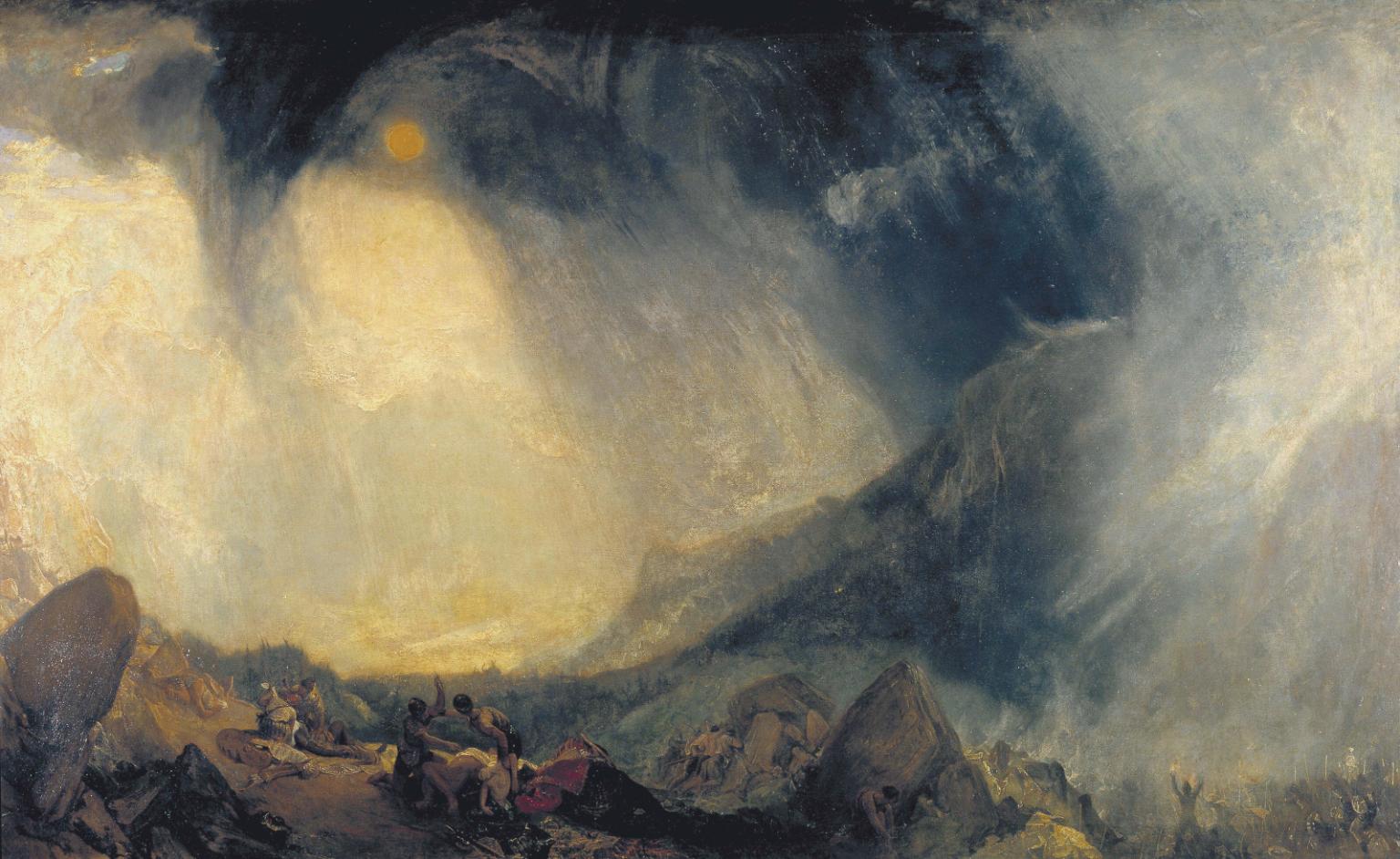
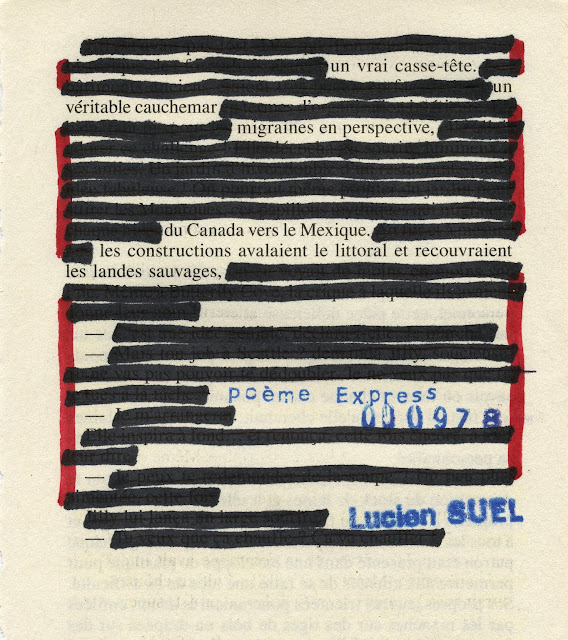
Arno Schmidt, Zettels Traum (1970) and Die Schule der Atheisten (1972)
Tatyana Tolstaya, "The Square," New Yorker, June 12, 2015
Sherlock "A Study in Pink" episode (season 1, episode 1) 2010
The incomplete letters spelling a that begins with "Rach" turns out to mean the German word "Rache," not the proper name "Rachel."
Predatory Reading vs. Literary Criticism

REQUIRED VIEWING:
David Foenkinos, The Mystery of Henri Pick


The Mystery of Henri Pick (dir. Rémi Bezançon, 2018)

THE MYSTERY OF HENRI PICK - Trailer
Recommended (a French TV or the kind represented in the film).
Découvrez la bibliothèque idéale: L'importance de la lecture dans la compréhension Feb 9, 2018
Carlo Ginzburg and Anna Davin, "Morelli, Freud, and Sherlock Holmes: Clues and Scientific Method," History Workshop, No. 9 (Spring, 1980), pp. 5-36
How to Read a Book 1940 edition
How to Read a Book 1966 edition
How To Read A Book 1972 Edition
FELMAN, Shoshana. « On Reading Poetry : Reflections on the Limits and Possibilities of Psychoanalytical Approaches » in The Purloined Poe. John, P. Muller (ed.), William, J. Richardson (ed.) 1988.
J.G. Ballard, The Index The Paris Review, vol 118, (Northern) Spring, 1991. It is copyright © the Estate of the Late J.G. Ballard, 1977, 1991.
Nick Thurston and The Remove of Literature Blanchot The Space of Literature
Sigmund Freud, Delusion and Dream An Interpretation in the Light of Psychoanalysis of Gradiva, Part I
Gabriele Mackert, Jacques Rançiere, et al, Un Coup de Des: Writing Turned Image, an Alphabet of Pensive Language (2009)
Peter Stallybrass on random access reading and cross-referencing textual apparatus
The last 5 minutes of Abbado's Mahler 9th at 2009 Lucerne Festival
Mahler - Symphony No. 9 - Abbado - Lucerne Festival Orchestra 2010
Gustav Mahler Symphony No 7 E minor, "Song of the Night" Abbado, Lucerne Festival Orchestra, 2005
This course will examine the difference between paraphrasing a text and reading it closely, beginning with the New Critics, focusing primarily on William Empson, and ending with the notion, posed by Jacques Derrida and Paul de Man, that reading closely means arriving at an impasse, at “unreadability,” and hence closure. We will also read Stephen Booth’s celebrated Yale edition of Shakespeare’s Sonnets, a masterpiece of close readings (without reading) that productively frustrates any reader’s attempts to make use of it. We will read not only what is in the text but what isn't. How do you read chapters that are declared missing by the author? How do you read a poem that calls forth a pun the poem does not make? Three short papers. Co-leading class discussion twice during the semester. Readings will include canonical literature as well as canonical works of literary criticism and literary theory. Discussion questions on the films or readings due the day before each class. Weekly quizzes.
Ezra Pound, ABC of Reading
T.S. Eliot, "The Wasteland"
Reader Response: Stanley Fish: Is there a book in this class? Is there a book in book history (now that the History of the Book)?
Garber, Marjorie B., The Use and Abuse of Literature (2011)
John Guillory, Professing Literature (2023)
Is all reading a version of what Pierre Bayard calls "non-reading?" In addition to the works mentioned above, selected readings will include chapters from Gerard Genette’s Paratexts; Michel Foucault’s “Lives of Infamous Men”; Bill Sherman’s Used Books; Will Hogan’s The Thing The Book; Nicholas Nace’s Catch-words; Markus; Mary Franklin-Brown’s Reading the World; Susan Howe's Concordance; Anna-Sophie Springer and Etienne Turpin’s Fantasies of the Library; Henry James, The Aspern Papers; Pierre Bayard, How to Talk About Books You Haven't Read;
I will be asking you to learn how to do something no one may ever have asked you to do: it's called close reading. (Please do not confuse being moralistic and judgmental--"it didn't do 'x' and it should have done!"--with being critical--"why is the work doing what it is doing the way it is doing it?")."
Close reading means paying attention to language, to the words the author has used, the order in which they are used, and appreciating how well they are used. It means paying attention not to what is said but to how it is said; it means paying attention to the structure of sentences and the structure of the narrative; it means paying attention to tropes such as metaphor, metonymy, and irony, among others; it means being alert to allusions a work of literature makes to other works of literature.
See Cleanth Brooks, "The Heresy of Paraphrase," in The Well-Wrought Urn.
Close reading is a practice designed for literature, for texts that are extremely well-written. Literature is universal. Literature is often difficult to write. And it is often difficult to read. Not just anyone can write it. And not just anyone can read it closely. (If you do not know how to write a grammatical sentence or how to punctuate or how to use words correctly, you cannot learn how to read closely.) All writers of literature are excellent close readers. They know humongous amounts of (big) words.
Do not ask about the author or the historical context. Do not ask speculative questions. They cannot be answered and so are not productive for discussion. Do not ask what the work tells us about some general issue today. Ask about what the work says.
Abridge the description below: Cut it down from 468 words to less than forty words:
Herman Melville, Chapter 42 "The Whiteness of the Whale," in Moby Dick.
Though in many natural objects, whiteness refiningly enhances beauty, as if imparting some special virtue of its own, as in marbles, japonicas, and pearls; and though various nations have in some way recognised a certain royal preeminence in this hue; even the barbaric, grand old kings of Pegu placing the title “Lord of the White Elephants” above all their other magniloquent ascriptions of dominion; and the modern kings of Siam unfurling the same snow-white quadruped in the royal standard; and the Hanoverian flag bearing the one figure of a snow-white charger; and the great Austrian Empire, Caesarian, heir to overlording Rome, having for the imperial color the same imperial hue; and though this pre-eminence in it applies to the human race itself, giving the white man ideal mastership over every dusky tribe; and though, besides, all this, whiteness has been even made significant of gladness, for among the Romans a white stone marked a joyful day; and though in other mortal sympathies and symbolizings, this same hue is made the emblem of many touching, noble things- the innocence of brides, the benignity of age; though among the Red Men of America the giving of the white belt of wampum was the deepest pledge of honor; though in many climes, whiteness typifies the majesty of Justice in the ermine of the Judge, and contributes to the daily state of kings and queens drawn by milk-white steeds; though even in the higher mysteries of the most august religions it has been made the symbol of the divine spotlessness and power; by the Persian fire worshippers, the white forked flame being held the holiest on the altar; and in the Greek mythologies, Great Jove himself being made incarnate in a snow-white bull; and though to the noble Iroquois, the midwinter sacrifice of the sacred White Dog was by far the holiest festival of their theology, that spotless, faithful creature being held the purest envoy they could send to the Great Spirit with the annual tidings of their own fidelity; and though directly from the Latin word for white, all Christian priests derive the name of one part of their sacred vesture, the alb or tunic, worn beneath the cassock; and though among the holy pomps of the Romish faith, white is specially employed in the celebration of the Passion of our Lord; though in the Vision of St. John, white robes are given to the redeemed, and the four-and-twenty elders stand clothed in white before the great-white throne, and the Holy One that sitteth there white like wool; yet for all these accumulated associations, with whatever is sweet, and honorable, and sublime, there yet lurks an elusive something in the innermost idea of this hue, which strikes more of panic to the soul than that redness which affrights in blood.
To deal with the horrific events in some of the literature we will read, we will think about trauma in two ways, first as unspeakable and second as a story. Literature can be thought of as a therapeutic resource you can turn to again and again but not as a solution. Literature just raises questions, the best questions being the ones no one ever thought to ask. Literature doesn't make you a better person. It is not a catechism, a program, a credo, dogma.
Aesthetic value. What is it? Pleasure of the text
SAMUEL TAYLOR COLERIDGE, "Constancy to an Ideal Object"
La Pléiade: du courant littéraire à la prestigieuse bibliothèque
Robert Darnton, "What Is the History of Books?," Daedalus Vol. 111, No. 3, Representations and Realities (Summer, 1982), pp. 65-83
Robert Darnton, The Case for Books: Past, Present, and Future (2009)
Robert Darnton, "In Defense of the New York Public Library," June 7, 2102
Keith Richards: "There's Two Sides to Every Story" (Part 1)
Keith Richards: "There's Two Sides to Every Story" (Part 2)
Craig Dworkin, Reading the Illegible (2003) PN1031 .D97 2003
Peter Szendy, À coups de points : La ponctuation comme expérience. Paris: Les Éditions de
Minuit, 2014. (book review in French)
Louis Luethi, On the Self-Reflexive Page. Roma Publications (2010) PR851 .B355 2003
Garrett Stewart, Bookwork: Medium to Object to Concept to Art (2011)
Christopher Fanning, "Sterne's Page"
Calhoun, "The Word Made Flax"
The 5 Best Punctuation Marks in Literature
Theodor W. Adorno, "Puncutation Marks"
Edgar Allen Poe, "X-ing a Paragrab"
I will be asking you to learn how to do something no one may ever have asked you to do: it's called close reading. (Please do not confuse being moralistic and judgmental--"it didn't do 'x' and it should have done!"--with being critical--"why is the work doing what it is doing the way it is doing it?")."
Close reading means paying attention to language, to the words the author has used, the order in which they are used, and appreciating how well they are used. It means paying attention not to what is said but to how it is said; it means paying attention to the structure of sentences and the structure of the narrative; it means paying attention to tropes such as metaphor, metonymy, and irony, among others; it means being alert to allusions a work of literature makes to other works of literature.
See Cleanth Brooks, "The Heresy of Paraphrase," in The Well-Wrought Urn.
Close reading is a practice designed for literature, for texts that are extremely well-written. Literature is universal. Literature is often difficult to write. And it is often difficult to read. Not just anyone can write it. And not just anyone can read it closely. (If you do not know how to write a grammatical sentence or how to punctuate or how to use words correctly, you cannot learn how to read closely.) All writers of literature are excellent close readers. They know humongous amounts of (big) words.
Do not ask about the author or the historical context. Do not ask speculative questions. They cannot be answered and so are not productive for discussion. Do not ask what the work tells us about some general issue today. Ask about what the work says.
"Let us pause for a moment at this journey, planned for such remarkably uncogent reasons, and take a closer look at our hero's personality and behaviour."
I designed this course myself and am looking forward to teaching it this semester. If you have a question or a problem, please contact me in class or at [email protected]. (I am the manager.)
Email all work for the course to me at [email protected]
No cell phones, ipads, or laptops in use during class.
We are living in exceptionally stupid times.
I don't do trigger warnings. They don't work. They are based on evil and stupid assumptions about human psychology. See Pavlov's dog and B.F. Skinner's box.
You have been warned. :-)

Guy J. Williams, "Harkness Learning: Principles of a Radical American Pedagogy"
"What we must not forget, however, is that it is in the completion of the text by the reader that these adjustments are made; and each reader will make them differently. Plurality is here not a prescription but a fact. There is so much that is blurred and tentative, incapable of decisive explanation; however we set about our reading, with a sociological or a pneumatological, a cultural or a narrative code uppermost in our minds, we must fall into division and discrepancy; the doors of communication are sometimes locked, sometimes open, and Heathcliff may be astride the threshold, opening, closing, breaking. And it is surely evident that the possibilities of interpretation increase as time goes on. The constraints of a period culture dissolve, generic presumptions which concealed gaps disappear, and we now see that the book, as James thought novels should, truly "glories in a gap," a hermeneutic gap in which the reader's imagination must operate, so that he speaks continuously in the text.
Barthes denies the charge that on his view of the reading process one can say absolutely anything one likes about the work in question; but he is actually much less interested in defining contraints that in asserting liberties.
When we see that the writer speaks more than he knows what we mean is that the text is under the absolute control of no thinking subject, or that it is not a message from one mind to another."
--Frank Kermode, "A Modern Way with the Classic"
New Literary History Vol. 5, No. 3 (Spring, 1974), pp. 415-434; pp. 425; 432; 433
The reason literature, film, and philosophy are so great, so deeply admired yet often controversial, even despised, is that writers are free to say anything they wish they way they want to say it, filmakers get to show images of anything they wish the way they want to show them, and philosophers can ask philosophical questions about anything they wish whenever they want. It's called FREEDOM OF EXPRESSION. As anyone who understands anything about language knows, intention and context do matter. I find attempts to get people fired from their jobs because of something they said repellent and unseemly.
Edgar Allen Poe, "The Purloined Letter"
January 13
REQUIRED READING:
January 18
REQUIRED READING:
Vladimir Nabokov, Pale Fire
Focus your DQs on the way Nabokov creates a fctional critical edition of a fictional manuscripts the editor will not publish; with a made up line-by-line critical commentary as well as an index by a fictional academic editor.
Required Reading:
Vladimir Nabokov, Pale Fire, pp. 11-190

Required Reading:
Vladimir Nabokov, Pale Fire, 190-315.
Recommended Readings:
Pale Fire: A Poem in Four Cantos by John Shade 2011
Dmitri Nabokov, Original of Laura
Yuri Leving, ed. Shades of Laura: Vladimir Nabokov's Last Novel, The Original of Laura Oct 28, 2013
January 20
REQUIRED READING:
To sign up to co-lead class, go to this google doc. Do not co-lead with the same person twice and co-lead at least four weeks after the first time you co-lead.
Once you have a partner to co-lead class discussion, create a google doc for your notes and share it with me by 5:00 p.m. the day before you are co-leading so I can add my thoughts. Make sure you allow me to edit the document.
January 25
REQUIRED READINGS:
January 27
REQUIRED VIEWING:
February 1
February 3
REQUIRED
February 8
Turn of the Screw
DUE by noon Friday February 11: write me an email at [email protected] with this sentence filled in: "I want to write about . . . . . [describe your topic] in . . . . . . [give the title of text or film] focusing on . . . . ." [what part exactly do you plan to close read?]. Again, email me your sentence by noon Friday February 11. You are free to choose to write about anything in the assigned readings and films that we have not already discussed in class. You may of course change your topic after you begin writing. But the end of Friday afternoon, I will email you back and greenlight your planned paper topic or not. If I do not greenlight it, I suggest you email me. I will then email you back explain to you what the problem is. And we can keep corresponding until I do greenlight your paper topic.
February 10
REQUIRED READING:
FIRST PAPER DUE February 12 by 11:50 p.m.
February 15
February 17
REQUIRED :
February 22 Tequila Sunset
REQUIRED READING:
February 24
February 24
REQUIRED VIEWING:
March 1
REQUIRED READING:
March 3
REQUIRED READING:
SPRING BREAK / SPRING BREAK
March 10
SPRING BREAK / SPRING BREAK\
March 15
March 17
REQUIRED READING:
REQUIRED READING:
March 22
REQUIRED READING
March 24
REQUIRED READING:
March 29:
REQUIRED READING:
March 31
REQUIRED READING:
APRIL 2:
SECOND PAPER DUE by 11:59 p.m. READ THROUGH THIS WEBPAGE. READ ALL OF IT. CLOSELY. VERY CLOSELY. PLEASE NOTE: Now that you have learned from your mistakes in our discussion of your first paper, and now that you have practiced writing twice a week through your DQs, I fully expect you to be able to make an argument in your essay, write grammatical sentences, use words properly, and punctuate properly. Papers that have ungrammatical sentences, mispunctuate, or misuse words will get "D" grades. Be sure to give yourself time to revise and to proofread your paper carefully before you send it to me at[email protected]. I recommend reading your work aloud. It's a good way to see what you need to revise. You can also get help at the Writing Program. See also the Plain Style: A Guide to Written English. READ THROUGH THIS WEBPAGE. READ ALL OF IT. CLOSELY. VERY CLOSELY.
April 5
REQUIRED VIEWING:
REQUIRED VIEWING:
REQUIRED VIEWING:
THIRD PAPER DUE April 16 by 11:59 p.m.
I designed this course myself and am looking forward to teaching it this semester. If you have a question or a problem, please contact me in class or at [email protected]. (I am the manager.)
Email all work for the course to me at [email protected]

Guy J. Williams, "Harkness Learning: Principles of a Radical American Pedagogy"

Jacques Derrida "sous rature" in Of Grammatology
Percy Lubbock, The Craft of Fiction




Sherlock "A Study in Pink" episode (season 1, episode 1) 2010
The incomplete letters spelling a that begins with "Rach" turns out to mean the German word "Rache," not the proper name "Rachel."




End with Pierre Bayard--not reading--is he really serious? Logical consequences of his own argument seem self-negating, worthless.
Also begin and end with Black square, blacked out writing, and redacted book gitmo
Email all work for the course to me at [email protected]
Gill Partington and Adam Smyth, ed. Book Destruction from the Medieval to the Contemporary (Palgrave, 2014)
Roger E. Stoddard, Marks in Books (Cambridge, MA: Houghton Library, Harvard University, 1985)
TENTATIVE SCHEDULE (Please expect minor adjustments to be made in the schedule from time to time; all changes will be announced both in class and on the class listserv.)

How Guantánamo Diary Escaped the Black Hole
Keith Houston, Shady Characters: The Secret Life of Punctuation, Symbols, and Other Typographical Marks
Jennifer DeVere Brody, Punctuation: Art, Politics, and Play
Nicholas A. Basbanes, On Paper: The Everything of Its Two-Thousand-Year History
Ian Sansom, Paper: An Elegy
Carlo Ginzburg, No Island Is an Island: Four Glances at English Literature in a World Perspective. Introduction translated by John Tedeschi. New York: Columbia University Press, 2000. PR99 .G516 2000
W.G. Sebald, A Place in the Country
Robert Walser, The Microscripts

Pencil Sketches / When Does Writing Become Drawing?
YFS Boundaries: Writing and Drawing Number 18 1994
Jacques Derrida, Memoirs of the Blind
Jean-Luc Nancy, The Pleasure in Drawing
The Handwriting on the Wall: Authors’ Notes as Art
"What we must not forget, however, is that it is in the completion of the text by the reader that these adjustments are made; and each reader will make them differently. Plurality is here not a prescription but a fact. There is so much that is blurred and tentative, incapable of decisive explanation; however we set about our reading, with a sociological or a pneumatological, a cultural or a narrative code uppermost in our minds, we must fall into division and discrepancy; the doors of communication are sometimes locked, sometimes open, and Heathcliff may be astride the threshold, opening, closing, breaking. And it is surely evident that the possibilities of interpretation increase as time goes on. The constraints of a period culture dissolve, generic presumptions which concealed gaps disappear, and we now see that the book, as James thought novels should, truly "glories in a gap," a hermeneutic gap in which the reader's imagination must operate, so that he speaks continuously in the text.
Barthes denies the charge that on his view of the reading process one can say absolutely anything one likes about the work in question; but he is actually much less interested in defining contraints that in asserting liberties.
When we see that the writer speaks more than he knows what we mean is that the text is under the absolute control of no thinking subject, or that it is not a message from one mind to another."
--Frank Kermode, "A Modern Way with the Classic"
New Literary History Vol. 5, No. 3 (Spring, 1974), pp. 415-434; pp. 425; 432; 433
The reason literature, film, and philosophy are so great, so deeply admired yet often controversial, even despised, is that writers are free to say anything they wish they way they want to say it, fillmakers get to show images of anything they wish, they way they want to show them, and philosophers can ask philosophical questions about anything they wish whenever they want. It's called FREEDOM OF EXPRESSION. As anyone who understands anything about language knows, intention and context do matter. I find attempts to get people fired from their jobs because of something they said repellent and unseemly.
TENTATIVE SCHEDULE (Please expect adjustments to be made in the schedule from time to time; all changes will be announced both in class and on the class email listserv.)
In order to include all students in class discussion, and in order to make it easier for you to read closely and thereby improve your own writing, We will close read, read slowly the assigned text sentence by sentence or the assigned film shot by shot. Discussion co-leaders and I will call on a student at random and ask that student to read a specific sentence out loud and then to close read it. If the student is unable to read the sentence closely, the co-leaders will call on another student and ask that student to read a specific sentence out loud and then to close read it. We will continue to discuss the same sentence until a student reads it closely. We will then proceed in the same fashion with the next sentence. And so on. Due to time constraints and because close reading is slow reading, we will skip parts of the assigned text, but we will always be talking and only be talking about words, syntax, punctuation, paragraphing, and narration in the text. As we move through the text, we will be able to make more general comments about parts of it. If students have comments to add on the sentence under discussion, they may raise their hands and make them once they have been called on by the co-leaders or me.
In order to learn the names of all the students in the class, I will take roll on canvas at the beginning of class. As I state on the requirements webpage, if you are late to class, I consider you absent. If you are absent more than twice, your final grade may suffer. If you are absent four times, you fail the class.
Here is what I have written on the requirements webpage:
"Attendance means not only being in class, but includes completing the assigned work for each class by the time it is due and arriving to class on time. (If you arrive late to class or if you don't do the discussion questions, you are counted as absent.)
Repetition is key to learning.
To learn how to understand a piece of music, a philosopher said, you have to hear it twice.
A conductor of baroque music said you have to listen to repeated hearings before you understand it.
"How full of meaning and significance the language of music is we see from the repetition of signs, as well as from the Da capowhich would be intolerable in the case of works composed in the language of words. In music, however, they are very appropriate and beneficial; for to comprehend it fully, we must hear it twice."
--Arthur Schopenhauer, "On the Metaphysics of Music"

Vienna and Schubert: 'Death and the Maiden' String Quartet - Professor Chris Hogwood CBE
"The greatest pieces of music are called classics simply because at a first hearing--that is terribly...very complicated to work out what's going on or even more complicated to explain to yourself why it's going on--even to hear it has to be heard several times. Probably after first hearing, immediately go back and hear it again, and on repeated hearings repeated things come to light."
--Christopher Hogwood
Marcel Proust on not understanding a piece of classical music the first time or even the tenth.
 |
 |
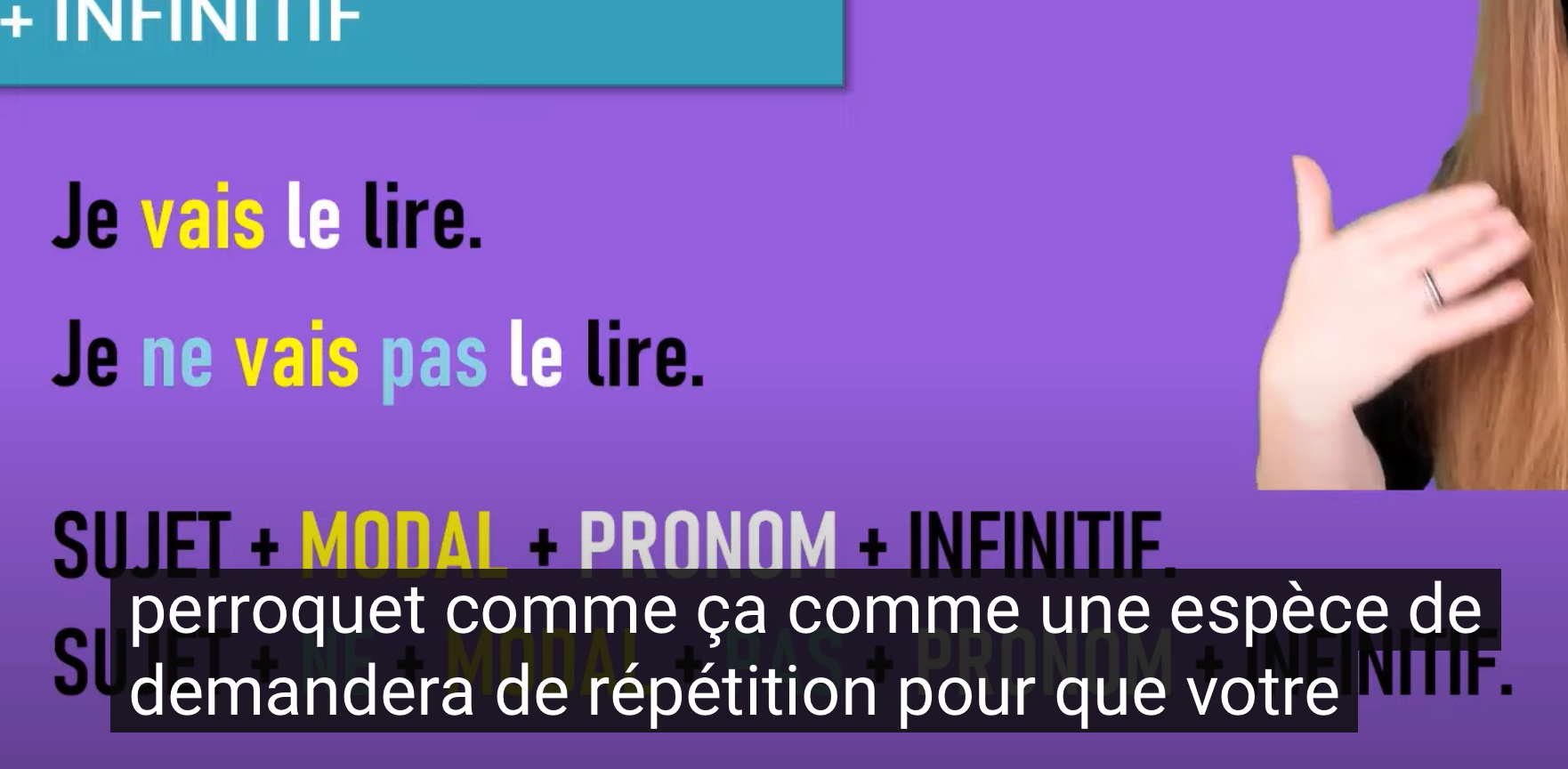 |
https://www.youtube.com/watch?v=mTziL0Xwa-s timestamp 29:00 |

--Barbara Johnson quoting Roland Barthes on rereading versus reading.
Nothing below is required for this course: